#also…hollywood career when daniel
Explore tagged Tumblr posts
Text

I would like to personally thank whichever marketing team decided to release this today and cleansing the timeline with the SWEETEST daniel ricciardo lore drop
#daniel ricciardo#f1#dr3#he takes photos!!! a lot!!!#he likes ball games and surfing!!!!#he’s very wag coded!!!#he approves of rpf#at least enough to write two films on it!!!#also…hollywood career when daniel
72 notes
·
View notes
Text
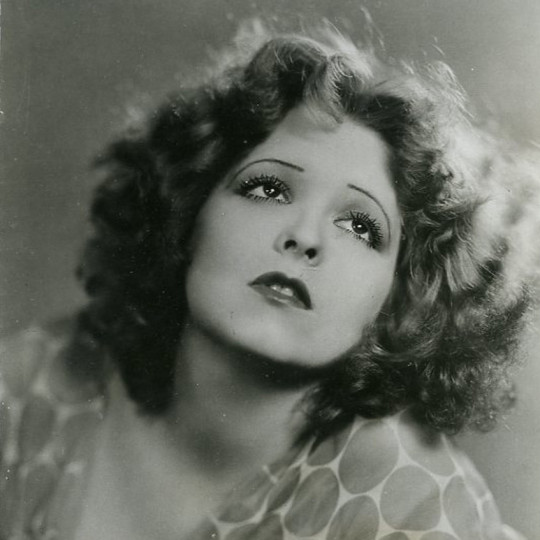
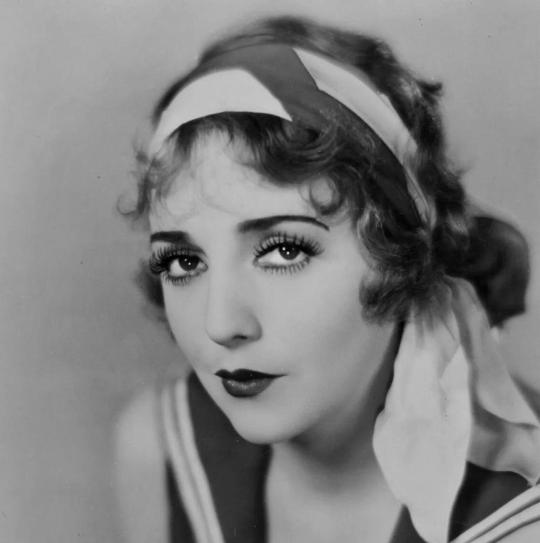
Propaganda
Clara Bow (Wings, It)—The original It Girl (literally), Clara was the epitome of a flapper film star. She was obviously a looker, but it was her acting that won over hearts. Watch the movie It (no clowns) to get a sense of her charms. And while she's most known for her silents, (including Wings, the winner of the first ever Best Picture Academy award) she did make some talkies! Contrary to popular belief, sound films didn't ruin her career; she reportedly just hated the process of making them. She had a really interesting background and it's a shame she's not as well remembered as others of her time.
Bebe Daniels (Rio Rita)—When Bebe Daniels was jailed for 10 days on a speeding charge, she had nearly 800 visitors who brought her things to make her cell comfortable — including a Persian rug. When she had some jewelry stolen in Chicago, Al Capone himself put the word out that it better be returned *or else*. Beyond all this, she was also a shrewd businesswoman who helped write, produce, and edit her movies. When her Hollywood career started to wane, she moved to England and became a radio (and then TV) star. She also played a female Zorro-type character in the silent film Señorita. [pics below the cut]
This is round 2 of the tournament. All other polls in this bracket can be found here. Please reblog with further support of your beloved hot sexy vintage woman.
[additional propaganda submitted under the cut.]
Clara Bow:
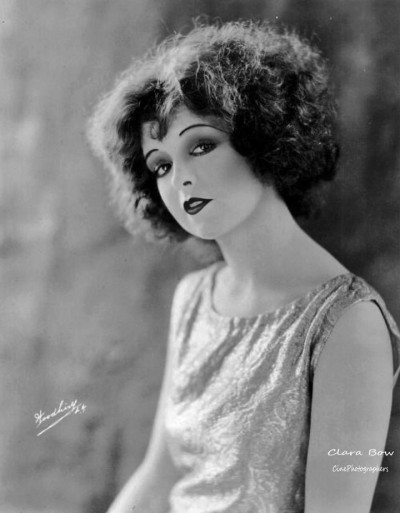
She has gorgeous doe eyes, how can you not love her?
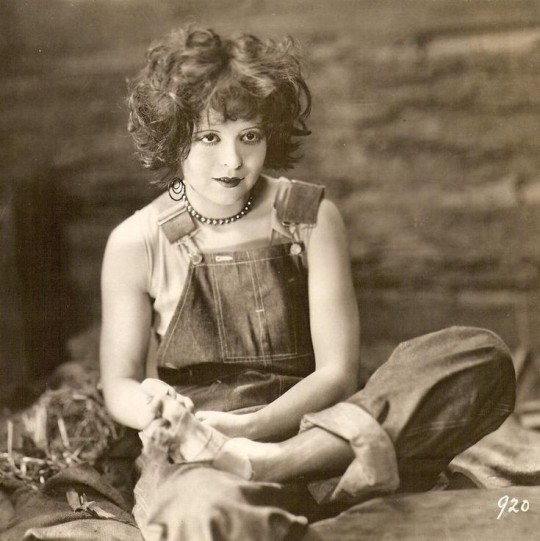
The original it girl! Flapper icon! She's sooo fun and charming and confident, it just shines through any film or picture you see of her.
I love love love her genderbendy boy style and her cute twinkly performances!! watch wings i s2g she absolutely brings it
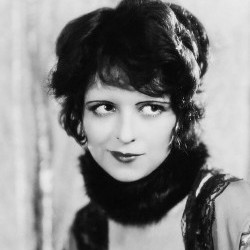
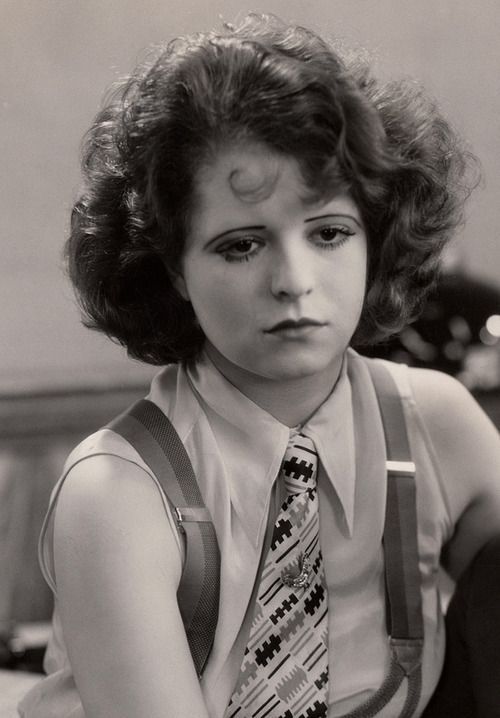
She's literally THE It Girl. Like actually, she's the term's namesake. She was an extremely prolific silent film actress with a reputation for wild behavior who defined the 20s flapper era. Her boyish frame, androgynous style, and red curly hair were widely emulated.
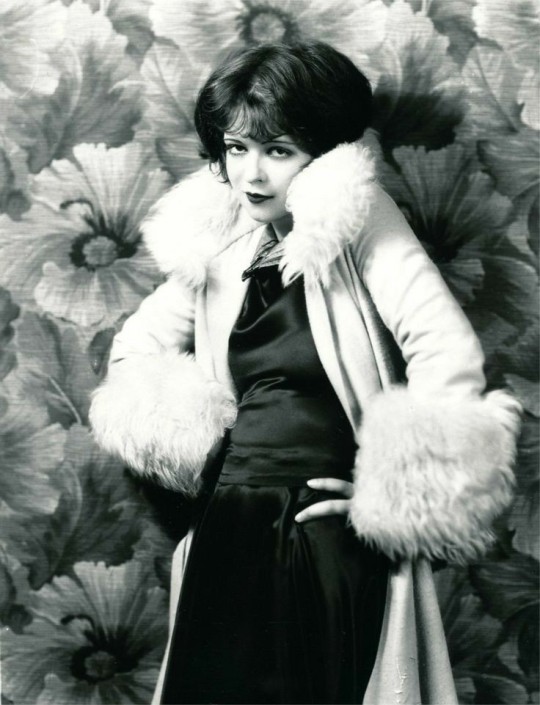
Bebe Daniels:
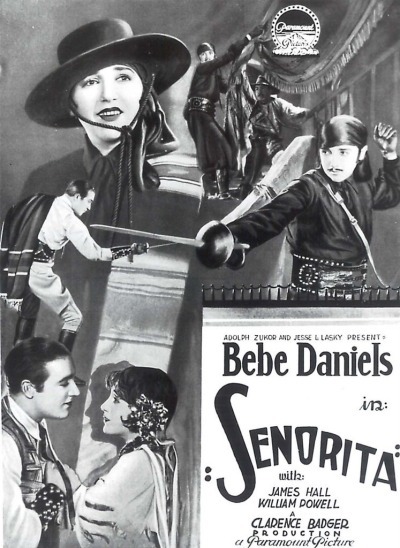
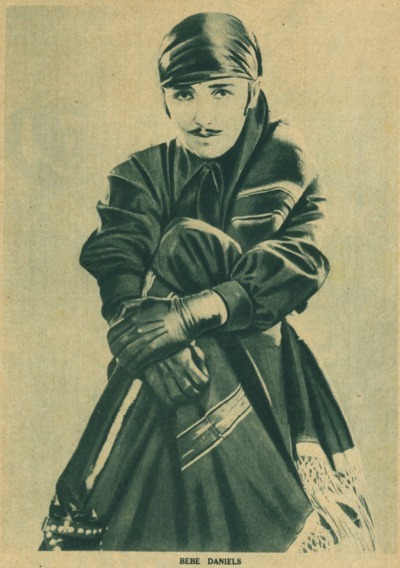
Linked gifset
Linked gifset 2
Linked gifset 3
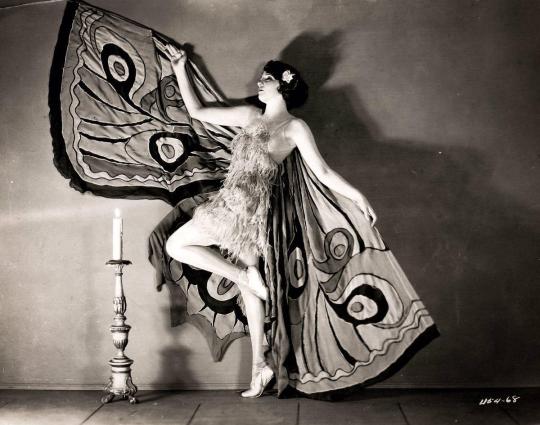
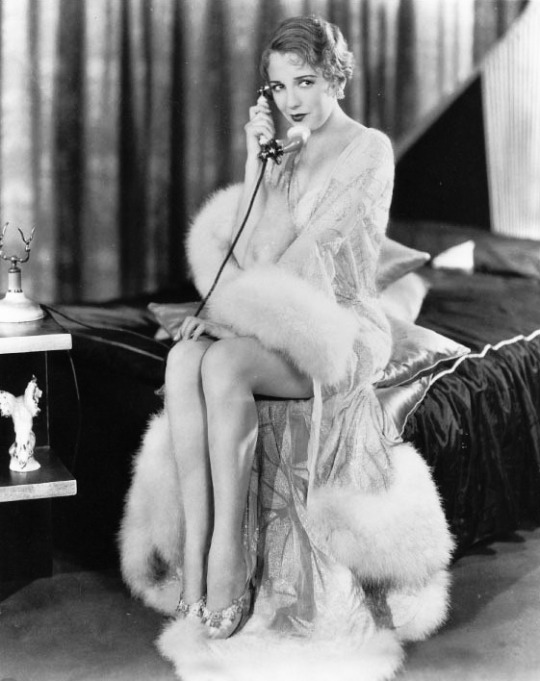
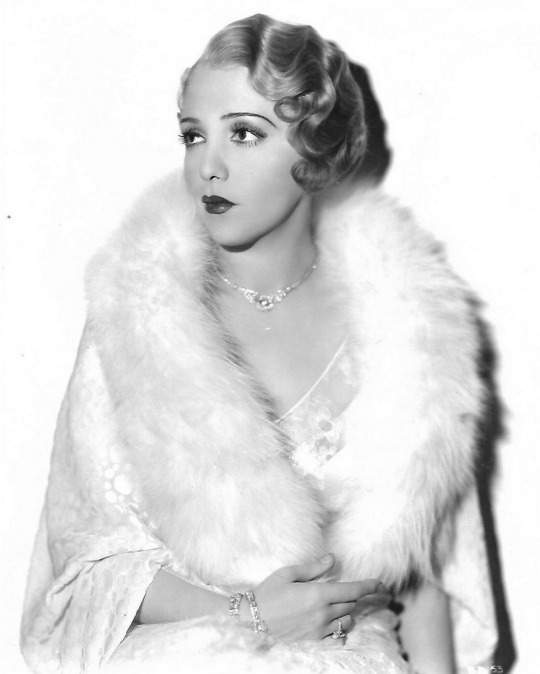
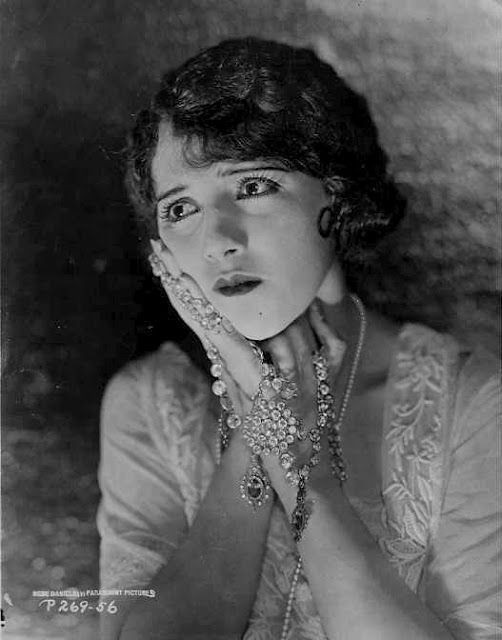
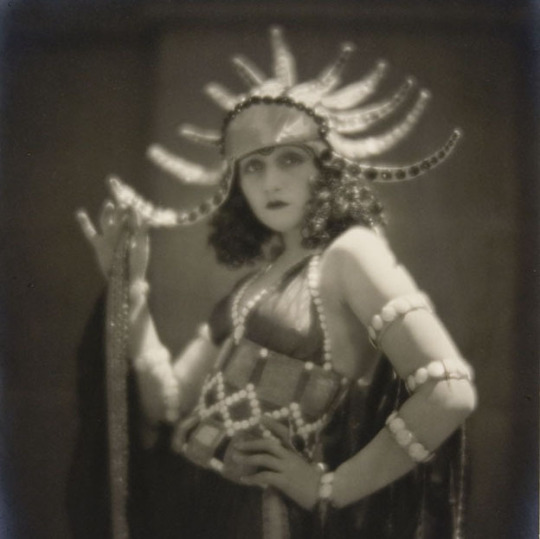
105 notes
·
View notes
Text

OKAY, so let me explain this unhinged thing that my imagination has spawned. I’ve created not just a bunch of headcanon Riddlers as animals but I’ve imagined an alternative universe populated by animals in which Batman as a franchise developed on its own. The Batman shows listed above are shows that exist in this alternative universe I’ve imagined. As such, I’ve included not just details about each of the Riddlers but also the backstory about all of the actors who play them and their relationships to each other.
Quick! Call Batman! - Clive Mortenson (1966-1970)
‘Quick! Call Batman!’ was your typical corny 60s television affair with onomatopoeia flashing on the screen and cheesy acting.
The Riddler in the initial version of the show was hammed up and would tell simple riddles as the clues. This version of the Riddler was mostly motivated by riches and power, and used riddles as a gimmick.
Clive Mortenson was a popular actor during the golden age of Hollywood. Due to his athleticism, he was often hired to do roles requiring the actor to do challenging acrobatics. In fact, he started his career as a stunt double in cowboy movies! His talent for acrobatics allowed him to play the Riddler as energetic and bouncy.
BATMAN: Brave and Brazen – Peter Trot (1984-1988)
This version of Batman was taken far more seriously and allowed for a more contemplative Batman. This show began to explore the themes of being a vigilante hero and established arcs over the course of its different seasons.
Unlike the previous Riddler (Mortenson) who would tell simple unrelated riddles, Trot’s Riddler produced riddles that were related to each other and built off each other to build to a greater theme for each episode featuring him. This version of Riddler was deeply obsessed with proving himself more intelligent than Batman, setting a precedent for the ‘quintessential’ Riddler. All future Riddlers would be obsessed with proving their superiority over Batman to some extent.
Peter Trot was an English superstar actor who rose to stardom in the 70s by playing of roles of James Bond, Sherlock Holmes and Robin Hood. In the 80s, he was intent on not being typecast strictly as a heroic leading man and proving he had range as an actor. Hence, he took on the role of the Riddler to prove he could play a villain. He received much critical acclaim for this role and would go on to act in both blockbuster and ‘artsy’ movies in the latter half of his career.
The Batman Files – Nadia Reddy (1993-1997)
The third show version of Batman leaned more into gritty and neo-noir aesthetics, attempting to make the Batman series more ‘edgy’ for the new youth. The show experimented with presentation, choosing to dress the Riddler as a ‘detective’ looking figure with a light green dyed trench coat.
The show experimented with having a female Riddler was well as a Riddler who would go beyond riddles and wordplay, to ciphers and codes. Unlike the previous Riddler (Trot) who dressed relatively elegant and acted sophisticated, this version of Riddler was far more sleezy, cheap and a bit rough and tumble. This Riddler’s motivations are played as more mysterious with the show never fully revealing the Riddler’s motivations.
Nadia Reddy become popular in the 90s for being a tomboyish and butch female actor, willing to take on roles that subverted typical gender roles, with the Riddler being her early breakout role. Nadia tended to pick the movies she found more ‘interesting’ and sometimes art-house projects throughout her career. Nadia, later in life, began to identity as non-binary and gender-fluid in the 2010s when the term became more well known to the general public.
BATMAN – Daniel DeCoetzee (2005-2009)
The 2000s version of Batman was the most self-serious, intent of exploring themes of society and the ethics of vigilantism. Episodes were extended to an hour as opposed to the previous shows which were half an hour per episode.
DeCoetzee version of the Riddler was very cold and unfeeling, a calculating mastermind who’s riddles came in the form of codes and complicated puzzles. This version of the Riddler was a technocrat intent on manipulating the powers of Gotham behind the scenes to create a new technocracy out of the government.
The writers of this version of Batman were intent on having actors method-act. That’s why they sought Daniel DeCoetzee, a former child science prodigy turned scientist and celebrity science communicator. The writers thought his background as an intelligent academic and his strength in public speaking might make him suitable. He turned out to be the perfect choice as in his bitter teenager years, he was briefly a technocrat but grew out of it. Daniel, thus, used the role of Riddler to explore a version of himself where he never grew out of that mindset.
Batman Adventures – Ian Blum (2013-2015)
Batman Adventures was a neo-retro version of Batman that took the inspiration to be corny and hammy from the first Batman show ‘Quick! Call Batman!’, but was still interested in exploring themes like the later shows.
Blum’s version of the Riddler is over-the-top and flamboyant, taking inspiration from Mortenson’s Riddler, but his motivations are clearly focused on proving that he is smarter than Batman like Trot’s Riddler. This version of the Riddler, instead of focusing on riddles or ciphers on their own, would focus on elaborate (and theatrical!) escape rooms littered with puzzles and riddles.
Ian Blum works mainly as a TV presenter, musician and singer. He was quickly identified by writers for his lively personality and high energy, which made him ideal for the role. Ian managed to convince the writers of Batman Adventures to allow him to write and sing some musical numbers for the show, villain songs of course. This later turned out to be a standout element of the show. Since finishing with the show, he has continued to present on TV and is working on writing a musical.
Batman & Gotham – Austin Tao (2023-)
‘Batman & Gotham’ is the current version of Batman. The show makes an effort to try and incorporate modern day affairs and issues, trying to channel the social commentary of Batman (2000s) while going for a gritty angle like The Batman Files.
Tao’s version of Riddler is a failed tech mogul from silicon valley who blames those in society for their ‘lack of intelligence’ and ‘poor foresight’ as the reason who his failed startups. In reality, his projects failed because he’s an egoistical narcissist who’s impossible to work with. Nevertheless, this version of the Riddler is intent on taking out his revenge on the world that he feels has wrong him. He decides to ‘prove his intelligence’ by setting out riddles, codes and puzzles onto the public and triggering terrorist-like bomb attacks in public locations if no one solves them in time.
Austin Tao is a bright young actor and long-time comic book fan intent on doing the role justice. He’s still only 22 and playing the Riddler has been his breakout role for him. Despite his inexperience, he has taken to the role well. Austin has even taken it upon himself to do ‘soft’ versions of what his version of Riddler does on the show and poses riddles, codes and puzzles to social media for the fans to engage with, something that has proven very popular.
Bonus!
All the actors who played the Riddler has a strong culture of mentorship where the older actors will often make time to work with the younger actors to ‘pass on the baton’ for the character that they all care a lot about.
All the actors are bisexual! It’s not just coincidence: Clive Mortenson was closeted when he took on the role of Riddler but Peter Trot was open about his sexuality during the 80s and pushed for his version of the Riddler to be bisexual like he was. When Mortenson did eventually come out in 1989, the Riddler become a quasi-bi-represention-symbol since both actors who had played him were bisexual. As a result, next generation writers decided to write all future versions of the Riddler as bisexual and hire specially bisexual actors.
Finally, I’d like to acknowledge gl1tchr (@gl1tchr) whose depiction of the Riddler as various animals, inspired this. (Their art is great!) Here’s a link to the art I’m referring to: https://www.tumblr.com/gl1tchr/764054301549215744/what-animal-do-you-think-each-of-the-riddles-are
#batman#riddler#the riddler#rat#fox#pangolin#cat#flamingo#red panda#anthro#anthropomorphic#furry#headcanon#villain#art
11 notes
·
View notes
Text
A fter 40 years in Hollywood, Ke Huy Quan is no stranger to getting knocked around, literally and figuratively. He burst into the pop-culture consciousness in 1984 as the adorable young sidekick Short Round in Indiana Jones and the Temple of Doom. It was a pure accident — he’d accompanied his brother to the open audition, and when a casting director overheard him coaching from the sidelines, he got the gig instead (over not just his own brother but a reported 6,000 other kids). Another scene-stealing turn in the beloved adventure movie The Goonies followed, but Quan’s budding career seemed to fizzle as he got older.
Then, after a decades-long drought on the big screen, action movies improbably came calling. In 2022, Quan starred as Waymond Wang, a seemingly diffident husband who transforms into a martial arts expert when crossing multiverses to save his family in the Daniels’ wild and emotional film Everything Everywhere All at Once. The role won him a Best Supporting Actor Oscar. Now, at 53, he’s ass-kicking his way through Love Hurts (out Feb. 7), playing a mild-mannered real estate agent with a secret past as a hit man — and taking as many blows as he dishes out, which is more challenging than you’d think.
“It’s a lot harder to react to punches than throwing the punch,” explains the actor, who does plenty of both in Love Hurts. “You have to sell it. When you get punched in the face, you really have to snap it back to make it look real.”
Here, Quan reflects on how he navigated tough times to live to fight another day.
Your characters in Indiana Jones and the Temple of Doom, The Goonies, and Everything Everywhere All at Once are everyday people becoming heroes. What’s your definition of a hero? A hero is someone who’s willing to make sacrifices without any benefits for themselves. My parents were heroes. They gave up everything they had to get my entire family here to the U.S. To me, that’s a true hero.
What advice do you have for young people coming from somewhere else and growing up like you did? I was constantly trying to fit in, because I was born in Vietnam but ethnically Chinese. A lot of people try to be like everybody else. My advice is to embrace your own identity. It’s beautiful to be different, and one day, people will see that, and that’s when everything looks great. When I became an American citizen, I changed my name to Jonathan Quan; that was my way to be like everybody else. When I decided to be an actor again, the first thing I did was go back to my birth-given name.
Editor’s picks
You were 12 when you made Temple of Doom. What was the best part about success at an early age? The best part was I was able to support my family at a young age.
What about the worst? Success came so easily that you expect everything in life would be that easy. Of course, life is never that easy. As you get older, you realize how lucky you are.
What lessons did you learn from Steven Spielberg when you were a 12-year-old filming Indiana Jones? That you could be very successful and still be a really nice, kind, and generous person. I learned a lot of my approaches to things from watching how he treated everybody on set. You don’t have to be an asshole.
What lessons did you learn from Harrison Ford? He’s incredibly giving as an actor. I remember when Steven would do a close-up on me, [Harrison] was always behind the camera, helping Steven, giving me lines, and helping me give the best performance. Also his work ethic: He says he doesn’t get paid to make the movie; he gets paid to promote the movie. To watch him for all these years and see how dedicated he is to his craft is something that I carry with me to every set that I walk on.
Related Content
What’s the most indulgent purchase you’ve ever made? I have a big family. There’s a total of 11 of us. When we first moved here to the United States, we rented this little house. So when I was able to make some money from Indiana Jones, the first thing I purchased was a house for all of us to live in. That was a proud moment for me.
Some people answer that question with a car or expensive jewelry. I don’t make those kinds of purchases. I’m pretty grounded. I think it’s the way I was brought up. Chinese people are pretty good with their money.
Did appearing in The Goonies and Indiana Jones help your social life at the time? When I was younger, it was a little bit difficult. Everywhere you go, you get recognized. It changed how I lived my life a little bit. This time around, I’m much more comfortable in my own identity and my own skin. I approach it with a huge sense of gratitude.
Does it bother you when people ask you to take selfies with them? No, I love it. Everybody loves it when they’re being appreciated. So when they ask for a selfie, it brings a smile to my face. And I have been asking for selfies a lot myself over the last couple of years, shamelessly. When I finally get to see the people whose work I’ve been loving and admiring for decades, I can’t help but go up to them and shower them with my love.
During the time you weren’t working, how did you handle being typecast and ignored? It was very difficult. I thought there was something wrong with me. I felt I wasn’t a good enough actor, or I wasn’t tall enough, or I wasn’t good-looking enough to land those roles. Looking back, it was a blessing. You get wiser when you have more difficulties and appreciate it more when you finally do achieve success.
Before your comeback, how did you handle doubts you had about your career? It wasn’t a year or two years; it was more than two decades. As time went on, your doubt begins to increase. The biggest thing for me was I didn’t want to disappoint my wife, Echo, or let her down. That gave me tremendous hope to carry on.
How is Hollywood different today from when you started out? There’s a lot more opportunities for minorities, for people who look like me. There are more opportunities, too, because of streaming platforms. Hollywood has grown so much. I still want to see more actors like me get their time in the spotlight, but Hollywood has changed quite a bit from when I started 40 years ago.
How do you think those decades away from the camera changed you as a person? I definitely have more empathy, more gratitude, and I understand things don’t come easily. I also understand how fortunate I am today to have this again.
Your character in Everything Everywhere All at Once lives in multiple universes. What do you need to play a multifaceted character like that? Life experience. You need to live enough life outside your characters. For me, stepping away gave me a chance to experience life more fully — the highs and lows, the quiet moments. That depth carries into the way I approach roles now. It taught me that acting isn’t just about technique; it’s about connecting to something real. You can’t fake that.
In your recent movies, you pull off incredible martial-arts scenes. How do you do that at 53? I do tae kwon do. In order to do kicks and punches, you have to be very flexible. I do a lot of stretching. That’s how you prevent yourself from getting hurt. As I’ve gotten older, I realized it’s not as easy. I’m proud I can still do the moves, but then I’ll wake up the next day feeling very sore. So I have to stay flexible.
How do you pick roles now? Right after I won the Oscar, I didn’t know what I wanted to do next. I asked Cate Blanchett for advice, and she said, “Be irresponsible,” meaning, “Don’t care what other people think, and just go with your heart.” And every time I read a script, if it affects me emotionally, and if the story has something to say, that gets me really excited.
What piqued your interest about Love Hurts? I said no to the role initially, because I thought it was written for somebody else. But [producer] David Leitch and his company wanted to create a different kind of action hero that doesn’t look like a badass until the situation calls for it. I grew up watching a lot of action movies. I love this genre. But the main character usually looked more like the Rock, Arnold Schwarzenegger, or Jason Statham. So the idea of that element of surprise really intrigued me.
You worked with former NFL star Marshawn Lynch on that movie. What did you learn from him? Never judge a book by its cover. He calls his mother every day, multiple times a day. I would see him FaceTiming his mother, and the director would say, “We’ve got to shoot,” and he’d say, “OK, Mom. I gotta go.” And he would hang up and get right back into character. It was just the sweetest thing to witness. And physically, he’s huge. He’s got solid muscles. To see how much he loves his family is inspiring.
You have another new movie coming out next month, The Electric State, in which you star opposite Millie Bobby Brown. Similar to you, she rose fame as a young actress on a Goonies-type TV show. What advice to you have for young actors like her? I love working with her. She’s so talented and she’s handled success beautifully. I think the young generation is very smart and savvy in navigating their careers. They don’t need advice from me. But what I would say is how incredibly lucky we are to have success at such a young age. So please give back and pay it forward.
Where do you keep your Oscar? In my home office. But I recently loaned it to the Academy Museum. So it’s going to be there on display. I hope when people see it, they feel like whatever dreams they have can come true.
What’s been the best part of your comeback? For a long time, there was so much uncertainty. I was constantly trying to figure out how I was going to achieve my goals or get my next job. But now, it’s really liberating when you have stuff on the calendar and you’re looking forward to what you’re going to do next and when you’re going to do them. Success gives you the luxury to step back and ask, “What’s next?” instead of “What’s possible?”
6 notes
·
View notes
Note
Do you know yet who the hollywood au is going to be for? And also when you say dark fic would both the reader and driver be ‘dark’ or just the reader?
So the au isn’t any driver specifically its just going to be the reader interacting with all the ones involved in the au and honestly both the reader and the driver would be dark… tho i might have some drivers be innocent considering the au’s narrative - for example, charles would be innocent because he’s a new actor trying to get a future in hollywood, daniel’s innocent bc he wants his big comeback and would do anything to have his stardom back… on the flip side, carlos would be dark because he doesn’t want our reader to ever leave his production house, and max would be dark because he’d try to do anything to ruin the reader’s career for his sister… does that make sense 😭😭😭
#bon’s anons#bon’s asks#like i hope im not just yapping shit here 😭#a multiverse if you will ‼️#thats so cringe im sorry
7 notes
·
View notes
Text
Timothée Chalamet Goes Electric
In Chapter Three of our ongoing project, the young actor talks candidly about coming of age over the last few years — a process he calls “adultifying" — during which he turned a professional corner, discovered a cohort of colorful peers, and learned to embrace his spirit of rebellion.
By Daniel Riley
Photography by Cass BirdOctober 17, 2023
“I don’t even know if I want to share this with you because it’s quite intimate,” Timothée Chalamet said, “but as an actor, you sort of live at a dining room table in your head, and you have about 30 personalities at the table, and you’re trying to attend to them, without going crazy.”
Assembled at the table were, yes, the many characters he’d embodied in films. But there were also the versions of himself that had been constructed in public and reflected back at him. There were the versions constructed through truth. The versions constructed through conjecture. The versions constructed through outright fabrication. And then finally—lastly—there was the person that he actually was and is beneath it all.
“And it was when that guy didn’t align with the first ones that things could get very trippy.”
One weeknight this summer, after when I typically go to sleep, Timothée Chalamet—the real one—came by my apartment building in downtown Manhattan. It was steaming hot and he had his hood up and a jean jacket on. Layers. He had a mask, too, a holdover for so many of his kind, even as a mask in public, at night, draws more eyes your way than it diverts. He was walking with pep, with freedom of movement.
He preferred to prowl his hometown at night these days, like Batman, when he can move readily in the shadows. Batman was hungry. “Do you know where I can get a sandwich?” he asked me.
After walking a little, he looked up. “I would just go there, but is there a better place than that?”
It was a grimy bodega that I know to be run by cats.
I persuaded him to get a bowl of pasta from a place that was willing to stay open late. We talked about his forthcoming blockbusters, Wonka and Dune: Part Two, and the transformation that had occurred both professionally and personally since the last time I saw Chalamet, in 2020.
“I bet I’m way calmer than I was talking to you in Woodstock,” he said.

That was the first COVID summer, which he’d spent between New York City and upstate New York, doing his best not to lose his mind. He was 24 years old then and an emerging Hollywood star, with all the opportunities laid out before him that he’d spent his early life fantasizing about. And yet there he was—there we all were—stuck, suspended mid-life, and bursting at the seams to get back to work. “I had spent a lot of time after high school with my head in the clouds, imagining a life as an actor, and totally oblivious to the life I was actually leading,” he said. “I was out of touch with an in-touch life. And during COVID, it flipped, and I was forced to become very in touch with my increasingly out-of-touch life. It was not good for me.”
But when I saw him this summer, he was three years older, three years wiser, and willing to indulge me with measuring the distance between then and now. For those keeping score at home, this is Chalamet’s third GQ cover, and the third story we’ve done in what has become a sort of longer-term project in progress. Six years ago, when I met him in his initial blush of fame from Call Me by Your Name, I saw up close a person in the last moments of their Before life. Three years ago, when we met for Chapter Two, I saw up close a person reckoning in real time with that rocket ship of fame and acclaim. And then this summer, here we were again, doing a version of what we’d done before—just walking around, hiding out, and otherwise taking stock of a moment in time in an early and extraordinary career.
“Even going to my friend Julian’s apartment,” he said, “there’s a Polaroid, ’cause he Polaroids everyone who has lived in the apartment, and there’s one of me from 2015, and when I see my expression there, I’m like: Man, I feel like I’ve lived seven lives since then.”
It was not just the stack-up of time—but the pivot he felt he was riding from one phase of his life and career to another. He brought up the recent bestseller Four Thousand Weeks (thesis: A good life is only 4,000 weeks, so how do you plan to not waste any of them?) and the 27 Club (he was now 27 himself) and the creeping fog that had slowly then suddenly enveloped people his age. “You start going on Instagram, seeing people from your high school getting married, friends having kids, and you start going: This balls-to-the-wall thing, even at this amazing level I’m at that probably couldn’t have gone better—you still start wondering, How long till you have to change?”
Material change was not that simple. This was, after all, one of the most beloved young actors in Hollywood. This was someone who had been told he was plenty good enough precisely as he was. This was a young man who, when he emerged—as though fully formed both onscreen and while promoting films, in both his talent and ebullient charm—went on one late-night show and was implored before a live audience to: Don’t ever change! Please don’t change!
“People are going to roll their eyes that these are actual problems to have,” he said, “but that is an interesting challenge to have to feel like for your life and your work and your art, that these are things where there actually shouldn’t be an evolution.”
“It’s like Bob,” he said, meaning Dylan, whom he’d been preparing to play in the forthcoming James Mangold film, A Complete Unknown, for over three years now. His head was in it, Dylan day and night, and he was attuned, as ever, to echoes between his own life and the stories he was training to tell. “The Dylan metaphor is going electric,” he said, referring to the infamous moment at the 1965 Newport Folk Festival when Dylan, that era’s one true acoustic god, plugged his guitar into an amp, brought out a band, and started to really rock. “Now, the great thing about going electric is that was in the name of art. That was an act of rebellion and a push in a musical direction that happened to be…. So I don’t want to say….” He wasn’t saying it—but he was straining to maybe connect the metaphor to some other things on his mind, as well. “God, it’d be so ironic to talk so much about acting and the art and the work, and then get caught in a loop about the demands of a public life. But…”
It went like this. The balance of indulging the aching artist’s desire, on the one hand, and navigating the blessing and burden of celebrity on the other. He took deep breaths. He knocked on wood a lot. On more than one occasion he broke into a confession with: “I definitely want to contextualize this with an attitude of gratitude—I heard Denzel say that on Desus & Mero.” He did not want to tread hastily, he did not want to toss any of it to the wind. “Every career is a miracle,” he said, with real gravity. But it might feel good, necessary even, for a little rebellion.
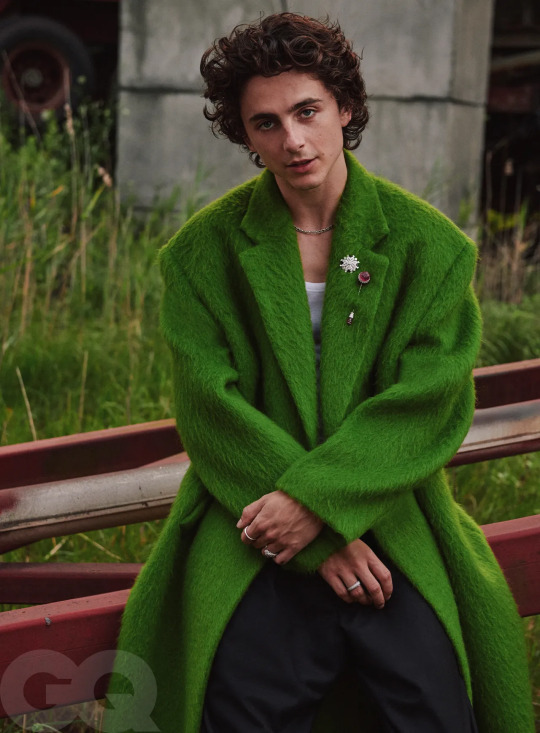
As we strolled through the Village after his midnight snack, every block sparked a memory. Here was the theater where his grandmother, mother, and sister were all part of the same dance piece. Here was where the first party was where kids were drinking “Mike’s Hard.” Here was the bookstore where he first met Ralph Fiennes and proudly declared that he’d just done a movie with Luca Guadagnino. I shared one of my own. Here was where Jennifer Lawrence lives, I said.
“Really?” Chalamet said. “Should we see if she’s home?”
We kept on moving to the place he was staying during his time in town. It was getting very late, and was very possibly the stillest night of the summer. No Taylor Swift concert close by. No film set in production. No playoff game just let out. It was, I will say as a now longtime resident, the absolute last circumstances in which one would expect to spot a movie star. And yet there, out of nothing, came a male cry from down the street, out the window of a passing cab.
“Timothée?!?!”
He looked toward it, head down and shoulders hunched. “Whattup.”
“Oh! My! God!” the voice replied, having been validated with a bull’s-eye.
A few blocks later, it happened again.
“Oh, my God!! Can we…?!”
And he slipped into photo mode, like a robot butler whose switch had been flipped to the On position. “Where are you guys from?”
I apologized for leading him through the heart of NYU.
“These are my people,” he joked.
Despite getting hounded by photographers or stopped or recognized, he still loved walking around New York on his own. It was what he’d done all his life, as everyone else did. It was equalizing, he said, even the idea that an air conditioner can drop on your head at any second.
But in recent years, it was his intense familiarity with those daily rhythms of his in New York City that made him realize it might be time for a major pivot. “After one too many days of doing the same thing, I just got this overwhelming sense that I was still playing the same hand of cards I’d had for a long time—but that I had a better hand to play,” he said. “I was living in this rental place that didn’t feel like home. I was getting the same bacon, egg, and cheese at the same deli. Resisting any lifestyle change.”
All the while his circumstances had changed. He had grown older. The movies were bigger. His profile was immeasurably larger. But he was holding onto something—why? He had seen it up close in Hollywood. The man-child. The people who so loved playing characters that they played characters in their real lives, too, without actually transforming themselves into more mature human beings. He knew the cliché about celebrities staying developmentally the age that they were when they became famous. But how is a beloved movie star meant to change the right way? How is he supposed to grow up? How does he meaningfully evolve his life and art without killing his core? This was only the most important thing there was for Timothée Chalamet. It might be worthwhile to chart the course. “All I knew,” he said, “was it was time to level up.”
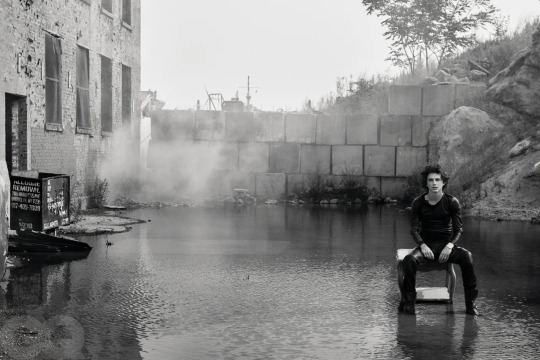
After our time in Woodstock in the summer of 2020, Chalamet flew to Budapest for Dune: Part One reshoots and got sick immediately. It was a familiar story after that summer spent locked down: The moment they let us out of our cages, we caught everything else there was to catch. It was another false start for him, every cell crying out to work.
It had been so onerous getting into Europe during COVID that when Dune wrapped he stayed on the continent. He spent some time in the South of France with Hedi Slimane, in Paris with Haider Ackermann, in Rome and Milan with Luca Guadagnino. Guadagnino handed him a script, Bones and All, a cannibal love story, an addiction-parable road film set at the fringes of the American middle. “Luca said: ‘I’ll do it if you do it,’” Chalamet said. This was both a validation of their fruitful creative partnership—but also a statement that seemed literally true. In the few years since Call Me by Your Name, Chalamet had become the sort of Hollywood property whose presence in an otherwise borderline project could get it greenlighted, and made quickly.
Chalamet was staying in an Airbnb in Rome, wandering around the city, just living out “a sort of blank period.” One thing he does recall is that he watched Nomadland, thought it was the most amazing thing he’d ever seen, and wanted to do something like it. Bones and All was maybe that something. He went to Milan to talk things over with Guadagnino and committed on the spot.
In the meantime, he returned to the US, hosted SNL for the first time, and prepped for his brief role in Adam McKay’s Don’t Look Up, alongside Leonardo DiCaprio and Jennifer Lawrence. He was in Boston for 24 days—14 of which were spent in quarantine and 10 of which were actually working. Chalamet, in his mellowest state, is a threat of energy, and here he was locked in another hotel room. “By the time I got to set I was buzz-ing,” he recalled, seemingly feeling the crazy in his body all over again. “That was the day Jennifer said was the most annoying day of her life, working with me and Leo. I exploded out of my room.”
He started prep on Bones and All right away that spring, still somewhat in the thrall of director Chloé Zhao’s Nomadland. Zhao introduced Chalamet to Derek Endres, one of the rootless travelers whom she cast to play themselves in the Oscar-winning film. Chalamet, who was born and raised in New York City and had spent no real time in the Midwest or the South, soaked up several blurry weeks driving around Ohio, Tennessee, and Nebraska with Derek, talking about life on the road and listening to folk music.

It’s difficult to underscore how polar the two ways Timothée Chalamet experiences time are. There are the long stretches during a movie production, during a press cycle, during a fashion campaign, when every minute is scheduled for days or weeks or months at a time. But there are other long stretches, in between the making of movies and promoting them, that are seemingly devoid of time as we experience it, with infinite expanses for developing a film character or developing himself.
Plan B producers Jeremy Kleiner and Dede Gardner, who worked with Chalamet on Beautiful Boy and The King, have a unique, rolling conversation with him about film and music and books, with references that range to the philosophical. “I think there’s a dimension of him that maybe not everybody would know necessarily,” Kleiner said, “where he just has this really wide wingspan in terms of what he’s taking in from the world around him and how that factors into what he feels he should be doing with his time.” These periods between films were historically the intervals that Chalamet said he would sometimes get “existential”—for better or worse. “Restlessness can be a pejorative term, but I mean it in a good way,” Kleiner said. “There’s a searching, a seeking.” Even early in his career, Chalamet seemed to exact total control when he was working on a film and an evolving sense of control when he was not. Those weeks on the road with Derek, those were good, restless weeks of searching, seeking.
“It’s something I think about a lot with Dylan,” Chalamet said, “that life rhythms are different. When you’re raised in the city, going stir-crazy during the pandemic, your life rhythm becomes agitated. And driving through the middle of the country listening to Townes Van Zandt, your life rhythm adjusts in a great way.”
They filmed Bones and All in the spring and summer of 2021, really moving from place to place as the characters do. His life rhythm adapted. “I got my second jab in Cincinnati,” he said, of his COVID vaccine, like it was a long-lost love, or a lyric to a Townes Van Zandt song. Lee, his cannibalistic character, wore the clothes of his victims and dyed red streaks into his hair, an act of what Chalamet called “self-styling” that he could relate to—a guy trying to express himself through his hair and his clothes. Living out of a truck at the American periphery, that took some effort to get in tune with. I saw immediately why it appealed.

Lee is an “eater,” a cannibal by blood, not choice. Chalamet plays him with an appropriate blend of swagger and self-loathing. During preproduction, reports revealed that Chalamet’s Call Me by Your Name costar Armie Hammer had been accused by several women of sharing sexual fantasies in which he represented himself as, yes, a cannibal. (Some DMs allegedly sent to one woman by Hammer read: “I am 100% a cannibal. I want to eat you.”) There were those who wondered if the seemingly ironic choice for a next film by Chalamet and Guadagnino was a little insensitive; there were those who wondered why Chalamet and Guadagnino didn’t lean into the insane confluence even more. “I mean, what were the chances that we’re developing this thing?” Chalamet said, reflecting on that strange period. When false reports suggested the film was inspired by the news, “it made me feel like: Now I’ve really got to do this,” he said. “Because this is actually based on a book.”
Chalamet’s face went stiff when I asked him to describe how he personally experienced the allegations against Hammer. “I don’t know,” he said, reluctantly. “These things end up getting clickbaited so intensely. Disorienting is a good word.”
Lee was the first character Chalamet helped develop in a major way with a screenwriter. It was also the first film he produced from tip to tail. When he introduced Bones and All to the world at the Venice Film Festival, he did so with a backless red jumpsuit from Ackermann. “When you’re promoting a smaller movie, you can stir it up a little,” he said. The role was new, subtle, and strong. There were flavors to it that felt at once different from anything else he’d done, and yet built around a center of intense familiarity. When I asked Dede Gardner how “the industry” regards “Timothée Chalamet the Entity,” whose name and face you can put on a movie poster and get to promote your film, she seemed almost incapable of looking past the pure performer: “I suspect he sits at the top of the totem pole,” she said. “But he is just so good. His gift is ferocious. His ability is just prismatic—in a way that it would by definition take him years for all the sides to show.” Lee, then, had come and gone—never to be seen again. He was already down the road.
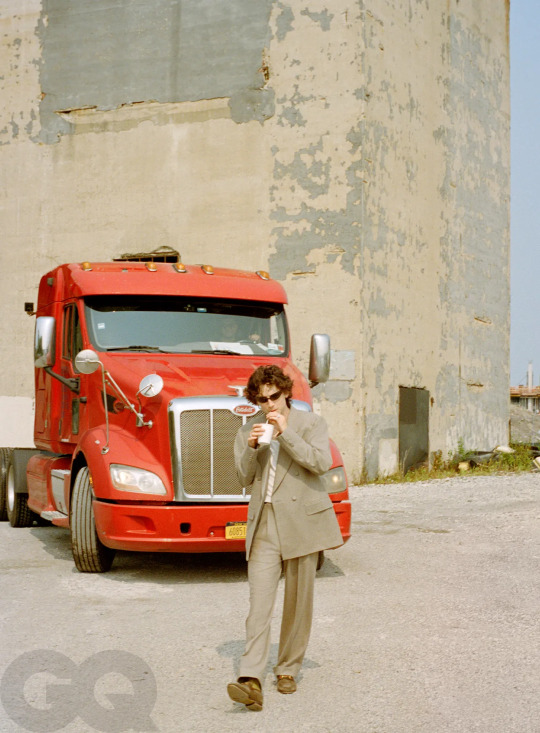
The day they wrapped Bones and All, Chalamet cut off his blood-streaked mullet, dyed his hair brown, and flew to Cannes for the premiere of Wes Anderson’s The French Dispatch. At one point, he leaned over to costar Bill Murray and asked him what he’d whispered to Selena Gomez on the Cannes red carpet in 2019. Chalamet laughed, reflecting: “He said, ‘Fame is fleeting!’ ”
Chalamet tried to take some time off, to soak up some vacation, but, he said, “the Wonka factory pipes were calling.” Director Paul King, best known for the beloved Paddington movies, had met Chalamet in London around the 2018 BAFTAs when, like so many, he’d been bowled over and seduced by Chalamet in Call Me by Your Name. When Wonka came King’s way, Chalamet was really the only choice for the role, King said. “It was: This could be great—but it could also be great for him.” Still, King couldn’t help but wonder what this guy, whom he’d met just once, would be like now that he’d become one of the biggest stars in the world. “It’s not always a recipe for ‘charming and focused,’ ” King said. “I’m a neurotic workaholic who will sort of leave no stone unturned—and I really felt he was a kindred spirit.”
This Wonka is also a musical, and Chalamet sings and dances throughout. It is, Chalamet said, “a throwback to LaGuardia,” meaning his performing-arts high school. “We’re telling a story here. This isn’t, like, athletic naturalism. It’s a shot of earnestness and sincerity, without the cynicism or dread or all the stuff we’re exhausted by.”
He trained in New York and London with Tony-winning choreographer Christopher Gattelli. “Sometimes with someone of that caliber, it’s almost like a chore to get them to do things, especially if it’s out of their comfort zone,” Gattelli said. “But he was the exact opposite—he wanted to go and go and go and do it over and over.” Chalamet hadn’t previously studied tap, among the hardest forms of dance to learn, but once he gained his confidence, Gattelli said, he couldn’t get him to stop. “He would Skype with his mom and his grandma, just to show them, because you could tell that he was genuinely proud of himself.” Of what he was picking up, but also of the way he was sort of carrying on this family tradition from his grandmother and mother—both trained Broadway dancers. “He would joke about it—like ‘It’s in my blood!’ And I was like: It is. It literally is.”
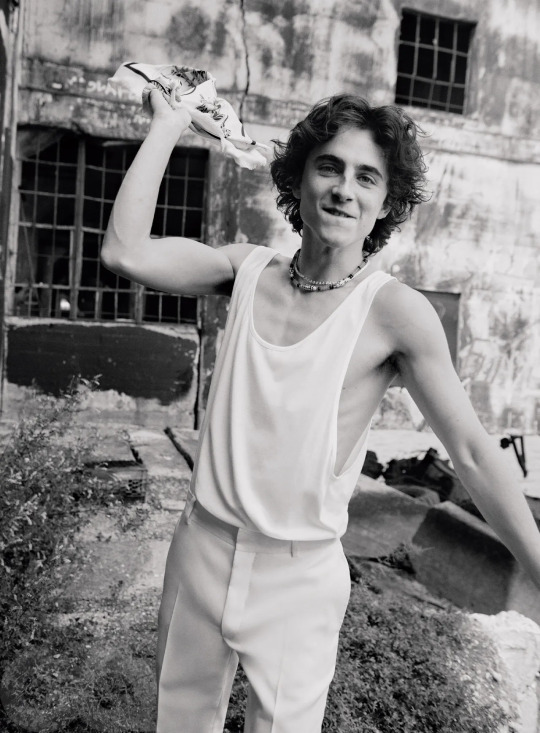

In Wonka, Chalamet plays a young Willy, fresh off a literal boat. It is pre-factory, pre–chocolate empire, pre–midlife trauma that curdles the previous film versions of the character, who’ve turned their backs on the world. “It would’ve been so easy to do an impression of Johnny Depp or Gene Wilder,” King said, “and it would’ve been sort of horrible. Because the people who’ve played Wonka before are brilliant and captivating and have done some famously wonderful performances that people have loved. So it’s really putting your head above the parapet.”
Between the choreography boot camp in New York and London, the voice training in LA, and recording songs at the Abbey Road Studios in London, there was considerable work before day one of filming. And then the already sizable shoot doubled in length due to COVID pauses. Every time someone on the crew tested positive, it was a mandated two weeks off. Production crawled, through the fall of 2021, the winter of 2021, and into the spring of 2022, with Chalamet posted up in the UK. It was, he said, a new challenge to keep his intense focus over that interval.
There was, as well, a distraction at home. His grandmother, whom he’d been especially close to all his life, had been sick and dying for some time—and it was becoming more and more evident that he might not make it home in time. “She was always so supportive of my career,” he said, “as she was also the voice in my ear to just live as normal a youth as possible.” Before he left New York for London that summer, Chalamet had her over to the apartment he’d been renting. He set up his laptop to film what he knew might be their final lengthy conversation. They just sat there for hours talking about stuff that she had never shared with him before. “But then when she left,” he said, “I saw that my laptop had died. And that was just a little metaphor for how scattered I was during that period—like, I was present to the conversation, but couldn’t even keep it together enough to chronicle it.”
It was a lot all at once that summer and fall—from Bones and All to promoting The French Dispatch to cohosting the Met Gala to starting on Wonka to promoting Dune. “I tried doing way too much, in retrospect,” he said. It was this awareness that he brought to Paul King when, with one major scene remaining, Chalamet asked to leave to be at his grandmother’s hospital bed. Chalamet had taken pride in the fact that he’d never shut down a production, but this felt like one of those moments in life. I asked King about it. “I think it’s sometimes easy because he’s a movie star and the lead to forget that there’s also a young man at the heart of this going through something,” he said. “And it’s very easy for the film to seem like the most important thing because everyone is turning up to work, but actually there’s something far more important going on.”
When he returned to London to finally wrap Wonka, he wandered the studio lot while they prepared the final scene. He stopped by the set of Barbie to say hi to his sometime collaborator and enduring caretaker Greta Gerwig. He bumped into Jason Momoa, in full Aquaman costume, walking to a soundstage. He looked at his own Wonka overcoat and top hat. “You start to realize you’re just another job on the lot,” he said, grinning. No matter the acclaim, no matter the fame, to the crews in Leavesden in the UK, Timothée Chalamet or anyone is just another guy in funny clothes, like the many who have come before and the many who will come again. It was good medicine. It was also a sign that it was time to go home—but where on earth was that now?

“I don’t naturally feel this way,” he said, “but during the throes of COVID it felt like people that were in LA with a little more privacy had it better figured out than I did.” There were many months on movie sets ahead of him, but for the periods in between, maybe there was something more permanent to return to. So before leaving to shoot Dune: Part Two last year, he bought a house in Los Angeles on a bit of a whim. “I was able to spend 10 days in it before I went to Dune, and just having it as the home base, it psychologically helped.”
Chalamet had never had the ability to just pick right up with the same cast and crew, as he did with Dune—and the result was a uniquely complex enterprise made “remarkably smooth,” he said. “For Part One,” director Denis Villeneuve said, “it was for Timothée his first big studio-movie experience. He had assurance, but I was feeling that he was kind of vulnerable, trying to find his way on a set like that, trying to find his focus and discovering how to protect his own bubble. And on Part Two, he came to set the first day and learned so much between both movies about how to secure his focus and to own his space.”
Something else happened in the run-up to filming related to one of his new costars, Austin Butler. “It started on Zoom,” Chalamet said, “when we did a cast reading.” Was Butler still talking like Elvis? I asked him. “No, here’s the thing, he was already talking like Stellan Skarsgård.” That is, on day one of the first read-through, Butler had already dialed his way all the way into the character, the heir to Skarsgård’s Baron Harkonnen. “And you could see everyone was, like…”—he laughed a little nervously—“I can’t overstate how inspiring it was to me personally.” It persisted throughout the production. “Because here was someone who’s a little older than me, but generationally we’re similar, and I don’t know how he would put it, but his journey was different than mine.” Butler had come up via Disney Channel and Nickelodeon before breaking out in Quentin Tarantino’s Once Upon a Time…in Hollywood and getting nominated for an Oscar for last year’s Elvis. “But he takes the work incredibly seriously. And I feel like I hadn’t seen that among someone my age, whether it was in drama school or on set, that did take the work that seriously but then after ‘cut’ wasn’t, you know, in some show of how seriously they took it—and instead is this tremendously affable, wonderful man.”

What Chalamet instantly recognized in Butler was someone who would challenge his own commitment—and force him to raise his ceiling. I suggested to Chalamet, a basketball fan, that the dynamic was like a star in the NBA who’d dominated straight out of high school but was suddenly confronted by a rookie who’d maybe cut his teeth in Europe and threatened his perch in the league. “Okay! Exactly!” he said. “I love that metaphor!” This was all just acting, of course. But here was someone who Chalamet felt could push him. Like: Man, I’d better practice harder.

“I think any great actor has a competitiveness to them, and Timmy is no exception,” Dune producer Cale Boyter said. “Whether that’s something they carry on the inside, or just in paying attention to what their peers are doing, a scene only gets better when one actor really brings it and then everyone else elevates.” Boyter described for me the emotional climax of Part Two, an enormous set piece that took weeks to film, and that centers on a showdown between Chalamet’s Paul Atreides and Butler’s Feyd-Rautha. “You’re talking about two of the most talented young actors of our generation facing off. I would say Timmy’s level of preparation going into the scene—well, knowing he was fighting Austin enhanced it.”
When production wrapped, Chalamet’s interest in the Austin Butler Playbook did not end. “You asked me what I’ve been doing in LA this year?” he said at one point. “I’ve basically been working with his entire Elvis team for my Dylan prep. There’s a wonderful dialect coach named Tim Monich. Vocal coach named Eric Vetro. Movement coach named Polly Bennett. I just saw the way he committed to it all—and realized I needed to step it up.”
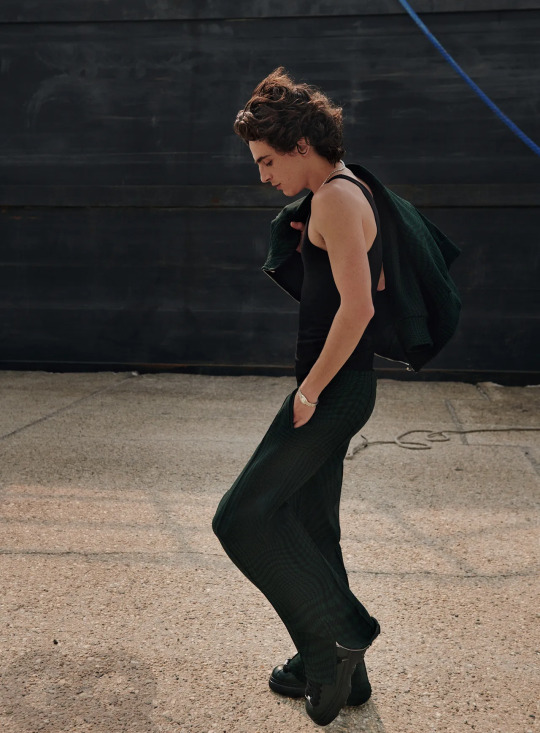
There was another person who had been in Chalamet’s ear—or at least his inbox—about the greater spectrum of training required for this new phase of leading---man-dom. “After I met Tom Cruise, right after finishing the first Dune, he sent me the most wonderfully inspiring email,” Chalamet said. It included a Rolodex of sorts of all the experts he might need for stunt training. A motorcycle coach. A helicopter coach. “He basically said, in Old Hollywood, you would be getting dance training and fight training, and nobody is going to hold you to that standard today. So it’s up to you. The email was really like a war cry.”
While filming Part Two, in the summer and fall of 2022, Chalamet said he saw Top Gun: Maverick eight times. On one occasion, he bought out a movie theater in Budapest for two bucks a seat and took the whole cast and crew. “Top Gun was just hugely inspiring to me last summer when we were making Dune,” he said. “Some of the crew were kind of scoffing at going, but I just thought it was one of the greatest films I’ve ever seen.”
Dune: Part Two marked the beginning of a new sense of self and purpose for Chalamet, who clearly embraced the opportunity and the responsibility of standing in the center of the frame in these bigger films. “Action-wise,” Villeneuve said, “I felt that he was much more trained than in Part One, and ready for the fighting sequences. I was impressed by his level of discipline for Part Two. You know, when you are the lead on a movie, there’s a presence, the way you approach your work and your discipline will necessarily have a ripple effect on the rest of the crew. He was the first one on set, always ready. And I was super pleased and impressed with how Timothée really embraced that discipline and became, for me, a real leading actor on this film.”
It always feels rare for an audience to witness a real-life off-screen pivot in a movie—someone growing up, someone breaking down, someone redeeming themselves. Call Me by Your Name was one of those pivots: a true coming of age, a transformation before our eyes. And here now, it seems, was another. “In Part One,” Villeneuve said, “the camera was capturing the performance of a teenager—I’m talking about the character, someone who was learning about the world and experiencing a new reality. But Part Two is really about someone who goes from the boy to the man, and becomes a leader, and even, I will say, a dark charismatic, messianic figure. It was the first time that I witnessed someone growing in front of my camera.”

When Dune wrapped in December, Chalamet returned to his new house in Los Angeles. He spent most days since, he said, “Dylan-ing hard.” He’d been rereading Dylan’s Chronicles, and it felt newly important to him to protect the artists’ imperative Dylan lays out there: “You need your ability to imagine, your ability to observe, and your ability to experience,” Chalamet said. “And if any one of those is compromised, your ability to create is compromised in some way.”
The place in LA provided him new cover to do just that. It was a sanctuary—a key to novel comfort, peace, and freedom. The house used to belong to Kenny G, and Pete Sampras after that. It had a beautiful tennis court, over which Chalamet had rolled in a basketball hoop and a Ping-Pong table, on which he was training most days for a potential new film. He was always toiling on the next thing or things. Preparation for roles that may or may not come to fruition. And some new things outside of acting. It was all top secret, he said, but one of those new projects sparkled, the other got you drunk. This spring and summer, though, it was Dylan in Position A.
Chalamet was very aware that the last time we talked at length, he was also deep in his preparation to play Bob Dylan. He had been, both literally and metaphorically, carrying around his guitar with him for three years now. He teamed up with Butler’s vocal coach, Eric Vetro, first on Wonka and then again for A Complete Unknown prep. Vetro, who’s worked with a number of actors on their high-profile music roles, singled out Chalamet for his balance of anything-is--possible enthusiasm with reverence for the work: “He does everything with such a playful air, but there’s always that core of real seriousness where he is gonna nail it.”
That balance of spirited and sober, of young and old—it was the lightning running through his body and mind at all times. When we’d been talking about celebrities staying forever the age they were when they got famous, he’d joked: “The trouble with me is I had an 81-year-old mind when I was 17.” That duality will probably make a pretty good Dylan. The voice work, Vetro said, was not about creating a perfect copy: “It’s taking on all the characteristics of Dylan’s voice and his mannerisms and his speech patterns, and bringing that into the music—so that when you hear Timothée do the music, what you’re really getting is the essence of Bob Dylan. You’re not getting an impersonation of him. It’s breathing new life into that voice that we know so well.”
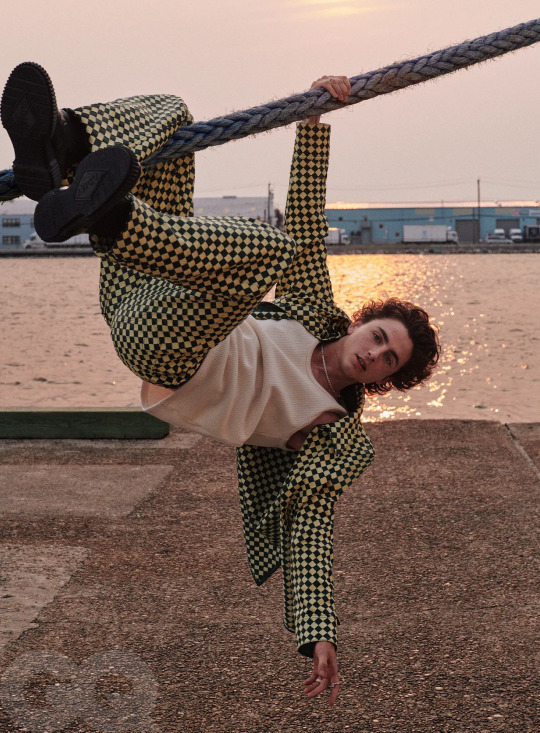
Chalamet has not yet met Dylan. “I didn’t want to three years ago, because I just didn’t want to for superstitious reasons,” he said. “Now I would love to.”
The study of Dylan was aiding him in ways large and small. “Bob is like my Fame for Dummies,” he said. “It’s a different thing now because there were so few people who were that well-known then that you could really just dodge everything and be unknown.... But I still try to learn from him.” Do the work. Then disappear. Do the work. Then disappear.

Chalamet spent much of the first half of 2023 keeping a low profile, disappearing. What was most important, for both him and his work, he said, was to protect the piece of his humanity that fuels performance. “You’ve got to have the experiences in your personal life that are usable to you,” he said. “The experiential rush of my career taking off was so new to me that those were the experiences that were feeding my work for a while. But you’ve got to have real experiences. Human experiences. You’ve got to fall in love, you’ve got to be bored. I talked about the crease in the cushion of the couch the last time we talked”—that is, in 2020, his bone-deep desire to get off his rocket ship and reacquaint himself with stillness, with just sitting on the couch for a minute—“but I never found the crease in that time! I never slowed down. I never disappeared from view. But this year, in LA, I feel like I have in a great way.”
On the occasions that he did pop up, the world took notice. The first time, in January, was in an Apple TV+ ad—where he experiences FOMO watching all his contemporaries star in hit Apple shows and films. The ad is charming, knowing, and cuts devilishly close to the old anxiousness I’d encountered earlier in his career.
The second time, in April, was when he was spotted filming a Bleu de Chanel commercial in SoHo with Martin Scorsese. When they first started talking about doing the spot together, Scorsese asked Chalamet if he’d ever seen the 1968 Fellini short Toby Dammit. Recalling it, he laughed (no, he hadn’t), but the first jolt of the 80-year-old director’s energetic vision was exhilarating. It didn’t let down during the shoot: “We were in Queens at four in the morning and he was bounding up the subway stairs,” Chalamet said. “It should’ve occurred to me sooner that I try to find something to work on with him. Yes, it’s a perfume ad, but for me it was an opportunity for an enormous education.” The result is another cunning facsimile of reality in which Chalamet sends up a caricature of himself. “It’s not lost on me that the only things I’ve shot since wrapping Dune,” he said, smiling, “are ads for billion-dollar companies satirizing a version of my life.”
Over the past six years, as Chalamet became famous and then very famous, he sometimes found himself measuring the distance between the real Timothée Chalamet and these varied perceptions of him. The dinner table of Timothée Chalamets. But this was precisely the sort of needle spinning that seemed to have subsided. This summer, it seemed the signal for true north was evident and clear and that the other noise was receding. He couldn’t control how the distortions traveled. He could only control who he was—and he was happy to own it.
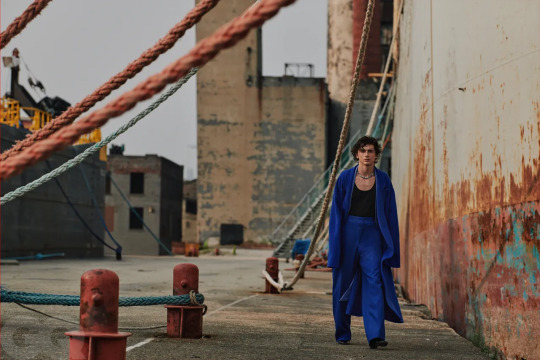
Which related to the other time Chalamet popped up in early 2023. This spring, he was spotted on his way to Tito’s Tacos in Culver City. Notable only because the person he was supposedly with was Kylie Jenner, and the photos of each of their SUVs in proximity to the other spun around the world instantly and sparked rumors of a possible pairing.
Chalamet is not naïve about how celebrity culture works. In fact, besides living it every day, he is perhaps the foremost member of the first generation of mega-celebrity who himself was as internet obsessed with his favorite artists as people are with him. Kid Cudi. Leo. Et cetera. He is a product of that fever, in no way above it, and so he understands the desire to get close, to get all the way in. “I can’t say that this stuff doesn’t matter,” he said, “because my intense fandom has led me to where I am.” But he also bristles at the suggestion that he might not be entitled to a wholly private life.
When I told him that this is all a fair and practically inalienable right, but that if he really wanted to be left alone he might not spend time with one of the four most followed people on Instagram, he nodded and chuckled: “This reminds me of that recent South Park episode with the Worldwide Privacy Tour,” he said, referring to a send-up of Harry and Meghan flying around in a private jet and appearing on a talk show to demand: We want privacy! We want privacy! “Sometimes, people are going to be hella confused when you say you’re trying to live a private life.”
After months of dodging rumors, the pair confirmed them by attending a Beyoncé concert together in LA in September, then the US Open men’s singles final together in New York, and otherwise not shying away from being out and about and affectionate together in public. Due to the SAG-AFTRA strike, I couldn’t follow up to ask him what happened to his existential plea for this part of his life to be left offstage, but I imagine he might’ve just protested: “We want privacy! We want privacy!”
That night this summer, roaming around New York, we got back to the place he was staying, and a little before 1 a.m., we really started talking. Chalamet wanted to get into the difference between how he was three years ago versus how he was now—and why.
Three years ago, he said, life was spinning. This was the moment in the cabin in the woods in Woodstock. He felt quite alone with his budding fame; literally isolated, with no one around who could really understand what was happening to him. It was like being the first one to hit puberty. He’d been “pedestaled,” he said. He did not know how he was meant to live. He did not know how a person, a person in his lonely cabin, was meant to be.
On Dune: Part One, he’d attached himself to the older men on set, men who were more like uncles than equals, like Josh Brolin, Jason Momoa, and Oscar Isaac. “I feel like for a while there, it was really just older people in the room around me,” he said. “People I love but just, generationally above. And there was a moment when I—I don’t want this to come across wrong, but I felt like I was without peers.” Whereas on Part Two, he was with his contemporaries. Other actors who understood as well as—if not better than—he does, he said, how to balance the improbable fame with the life’s desire to act well. There was Zendaya. Austin Butler. Florence Pugh. And even Tom Holland, who dates Zendaya and would visit the set.
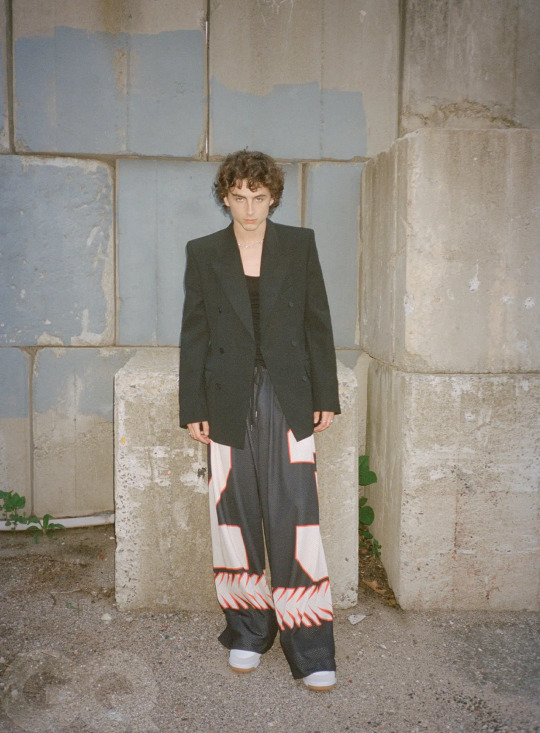
“It was so incredibly valuable to spend so much time with Zendaya and her assistant, Darnell, and when Tom would come to set too,” he said. “They’re level. They’re good Hollywood. They’re good-energy Hollywood. And then Austin and Florence. I feel like I’m creating a community for myself of people who care about the right things.”
“In Part One,” Villeneuve said, “Timothée was a little puppy with big dogs. The younger actor with the older mentors. In Part Two, he was with friends.”
“Look at Zendaya,” Chalamet said. “Just how much she’s able to achieve while also sort of letting everything roll off her back is mega-inspiring. She’s just doing.”
Here now was his class. The people his age who’d joined him in his strange circumstances, but who’d seemingly figured it out, whom he could look up to. It brought him peace. It gave him the comfort, the fellowship, the confidence, the inspiration, and the competitive motivation to do what he needed to hold onto what was worth holding onto and move on from the rest. It was time.
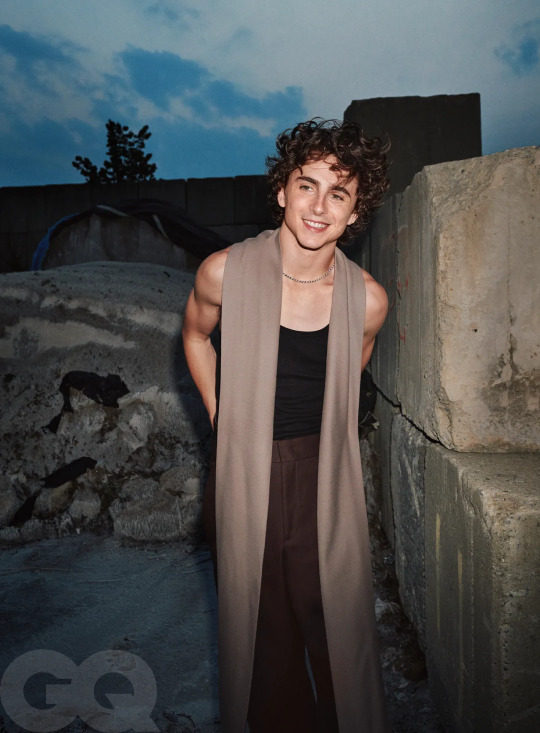
“At 24, I could have been content with the way I was doing things,” he said. “But that period of being stuck or stopped ended up being tremendously beneficial. It wasn’t just being isolated. It was actually a place to sprout from. And to bring more tenacity.”
It came up again and again from those I spoke to who’d come in contact with Chalamet these past three years. Here was this actor who had been elevated in such a way that he might’ve come to believe that his immense talent was enough, that his personhood alone was worth strangers’ obsession, that he inherently deserved the center of the frame. Instead, those people who knew him well said, he insisted on bringing even more effort, as though compulsively resistant to resting on his laurels. Not me—every rehearsal, every take, every interaction seemed to say. Let other people take this for granted.
“It’s this mix of challenging yourself and trying new things and venturing into new terrain—and so there’s that evolution,” producer Jeremy Kleiner said. “But there’s also a center—there’s a moral center, an aesthetic center. Whenever we spend time with him, it’s as it was, but it’s different. And you feel that mix of continuity and evolution—”
Yes, that was it exactly. Precisely the sensation of tracing my time with Chalamet from Chapter One to Chapter Two to Chapter Three. The way in which time passes, change occurs, but the center holds. That’s how you keep your mind, body, career, reputation, and integrity as an artist intact while still welcoming the rest—somehow performing the necessary surgery to shed that which needed shedding, while taking care to preserve it.

The efforts to push higher in his work dovetailed with the efforts to push ahead in his personal life. In both cases, the antagonist was the status quo—even if the status quo was much lauded and much loved. It was all part of growing up, of actively electing to evolve into the next version of himself. Of adding new versions of himself to that dinner table, or perhaps just asking some of those versions to head home for good. “When I was sitting in my grandma’s hospital room at Mount Sinai, and I knew I had two weeks left swimming in a chocolate tank to go back to, I was like, Wow, I’ve really gotta start putting some caissons into the earth or I’m going to be in trouble. I have no real solid footing to land after all this to spring forth from again. This is why people who turn 27 and refuse to start pulling the handbrake end up dying. It’s the last gasps of your youth hitting a wall. Your body is actually adultifying.”
Chalamet had asked me if he seemed calmer than when we were in the woods together three years ago—and the difference this summer was palpable. He had, it seemed, passed through some rough air but found clearer skies. He’d taken his ship higher. Leveled up. Things were simpler there. “Yes,” he said. “It had to become simpler in order for it to become really complicated again. And I hope that when I do this next movie, and you talk to me at the end of it, I’ll be in ruins.”
He had to change something to get out of a temporary storm. As a human and as an artist. He started treating his acting even more seriously. Embracing being a leading man. Training like he’d never trained before. He ditched his apartment in New York. Bought a house in LA. Started spending time with whom he pleased. But what happens when you eschew the things that made your career what it’s become? What happens when you deliberately defy the moves that led you where you’d always wanted to go, and try something altogether different? It was a risk. But it made perfect sense. It happens. Your family members start to die. Your elders get replaced by your peers. You pack up your life and plant roots elsewhere. You put down the instrument that made you known and pick up another one instead. You plug it in. Do you hear that? That’s the buzz of something new. Wait till you hear what it sounds like when you strum.

Daniel Riley is GQ’s global content development director.
A version of this story originally appeared in the November 2023 issue of GQ with the title “Timothée Chalamet Goes Electric”
59 notes
·
View notes
Text
‘AVATAR: THE LAST AIRBENDER’ STAR DALLAS LIU ON BEING ASIAN IN HOLLYWOOD
Actor on the rise, Dallas Liu, is stepping into his first leading role as Prince Zuko in Netflix’s live-action remake of Avatar: The Last Airbender. For those who grew up watching the popular Nickelodeon series—often dubbed by critics as one of the greatest animated television series of all time—the story of Aang and the four nations is both familiar and nostalgic.
Liu, however, has teased fans saying, “[Watching the new show is] going to be quite the experience.” Set for a February 2024 release, the remake is headlined by some of the most popular Asian actors in Hollywood including Daniel Dae Kim, Paul Sun-Hyung, Ken Leung and Elizabeth Yu.
As the story itself borrows elements from indigenous Asian tribes, it’s become culturally important to showcase the people as they are. Yet, when questioned about how Hollywood segments the nuances of the term “Asian”—broad in itself, encompassing countless ethnic groups spread across 48 countries—Liu reveals that being “Asian” isn’t necessarily the most important thing about any one character.

A cultural movement
“Typically the breakdowns [for an audition] will just be Asian, black, white, Latino, and [actors] will go into that because not always in every project are they going to need to explain the background of a character,” says Liu. “As Asians in Hollywood, we not only want to be able to tell a cultural story, we also want to be a character where [being Asian isn’t] the only thing about them.
“At the end of the day, we are real people living everyday lives. So although, culturally, we might be different, we’re all human beings at the end of the day.”
For Liu, who began his acting career at age 13, honing his craft has culminated at just the right time. “It’s super hot [to be] an Asian-American actor in Hollywood right now,” he laughs. Having previously appeared in Marvel Studios’ Shang-Chi and the Legend of the Ten Rings alongside Simu Liu and Awkwafina, Liu is at the forefront of a cultural phenomenon progressing towards the inclusion of Asian-influenced projects.

“I think as far as Hollywood goes, we’re doing a better job [at representation], but there’s always going to be room to improve.”
For him, the challenge becomes less about the scarcity of opportunity and more about experience. Having had a mentor himself at the beginning of his career, Liu ponders about the future of Hollywood and notes that more mentors will likely be available to guide young actors and actresses and lead them in the right direction. “We hold a lot of responsibility knowing that there are only more opportunities to come for all of us,” Liu says.
Succeeding in Hollywood
In a way, Liu is living an interesting paradox in Hollywood. While representation has been touted as one of the most important issues for this generation of artists, it’s also become something that mustn’t tie an actor down. “It’s just a character, at the end of the day,” says Liu. “People want to see what you can do with it regardless of how you look.”
“I’m living my life trying to make it as an actor, not necessarily as an Asian actor who wants to work only on Asian projects. I want to be able to do everything. I don’t want to limit myself to any sort of opportunities.”
What then is the most important factor when it comes to landing a role in Hollywood? “Preparation,” Liu shares. Less about how you look or who you are, preparation encompasses different strategies for different actors. For Liu, it’s as simple as knowing your lines and understanding what’s going on in the scene.
“A lot of auditions have been on self-tape because of Covid, so people are typically filming their auditions on their phones,” Liu says. “It might help to have a good lighting setup. Order a ring light and set it up behind the camera. But honestly, at the end of the day, it comes down to whether or not they like you and that’s usually out of your control, especially in the early stages.”
Coming from Hollywood and creating stories from the histrionic city has made Liu realise that rigidity has become passé for most storylines. He says, “It’s good to have those much broader and more general roles where everyone can come in and get a shot at [an audition].”
#natla#atla#avatar the last airbender#netflix avatar#netflix atla#avatar netflix#atla netflix#dallas liu#article#tatler
12 notes
·
View notes
Note
https://www.vox.com/culture/355242/hollywood-it-boy-diversity-problem-barry-keoghan-jacob-elordi-jeremy-allen-white
Interesting article, I wish me MOC were spotlighted lik a lot of these "white boys of the months"who can do 1 project and suddently are everywhere.
This was a VERY well-written article Anon! I enjoyed reading it! 😊 It really gave food for thought.
First off, I just wanna say that the Michael B. Jordan erasure is just.... 🥴 Seriously?? How are you all gonna act like this man doesn't exist??




Anyway...
I really do think that there are a lot of factors that play into 1) why there are so few "movie stars" of the younger generation these days, and 2) why there's such a lack of diversity.
Chiiiiiile....You're gonna need to take a seat, cuz I's got THANGS to say on this one! It's gonna be a long one lol. 🤣

RE: Movie Stars....
I think the reasons are:
We are living in a different age from the 90s. People need to keep in mind that "the 90s" was at least 30 years ago. Things have changed. People have changed.
The invention of social media, more online "presence" (something that wasn't around much in the 90s) has also played a role
Actors these days aren't living in the age of Tom Cruise, Will Smith, Denzel, or even Leo DiCaprio were when they were making it big. I don't think you can even really compare them.
I also feel like Hollywood is more so about IPs and less about nurturing movie stars. We're living in a post-Marvel world, and for a LONG time it's been the IP (not the ACTOR) that is selling these films. I blame Hollywood for placing emphasis on nostalgic films, "reboots", and IP-heavy films in order to guarantee a sure success at the box office, as opposed to nurturing actors to become movie stars. Tom Cruise didn't become an A-List movie star overnight. None of those A-list actors did. I think people tend to forget that! You have to give many of these younger actors some TIME.
Did I mention social media?? To me, social media has sort of taken away the aspect of "mystery" and "unattainability" that a lot of movie stars and A-List actors had back in the day. Now days, fans have their favorite actors at their fingertips, and they can even comment and interact w/them on social media. That was NOT a thing 30 years ago.
Being more "relatable" to fans is more of a thing than it was 30 years ago. If you're so "relatable" to fans now days, fans start to see you on THEIR level, and it might be hard to view you as a "movie star" when you're so down to earth and "relatable" Lol. 😅 Idk...just saying. You almost need an air of snobbery lol. 😅
RE: Lack of Diversity....
First of all, let's be honest, Hollywood has ALWAYS struggled in this department. 😒🙄 The article is right though, for a while there, it seemed like HW was making a turn for the better.... With films coming out staring actors like Mahershala Ali, Daniel Kaluuya, Chadwick Boseman, Michael B. Jordan, etc.
What happened?? Well, let's see shall we? Umm...First of all, Chadwick Boseman DIED. 😭 I actually saw him getting to the level of Will Smith if he had stayed alive, because he was just so darn likeable, and a VERY good actor.
Ummm....Jonathan Majors had assault charges... 😭 Yet ANOTHER talented Black male actor who was starting to get a lot of hype and attention, and was even starting to gain the label from women as "hot", even though he has a Butter Face lol. 😅🤣 But charges of assaulting your gf don't seem to go over too well when you're trying to make it "big" in Hollywood. 🥴
Rege Jean Page was another one who was labeled HOT (and he IS!) after Bridgerton aired. I was excited for him too, but then, his career seemed to take a turn for the worst after he no longer was on "Bridgerton". He still has a chance though to turn this around lol... But yea....
Kelvin Harrison Jr. is super talented imo, but I feel like he needs some more bigger films (he wasn't really the main focus in "Elvis" ) under his belt in order to get more girls to notice him. I remember that he was supposed to be in Euphoria (which could have gotten him more exposure) but then he dropped out all of a sudden (maybe due to filming conflicts w/another project).
My pick to lead the way is still Michael B. Jordan. Women LOVE him! 🥰 He's hot as idk what, he's charming, and he's been in large films, and even made his directorial debut with "Creed 3"! 😁
Daniel Kaluuya is also a great pick as well... But do women really "sweat" him like that?? Idk lol... 👀 You kinda need someone who has some sex appeal. I'm sorry, but when I see Daniel, I see a good actor, but for some reason, he kinda lacks that "something" that makes me say: "Ooooo yeaaa.... I wanna get with him for one night" lol. 🤣 I'm sorry, but that is probably what is lacking lol....for ME anyway. He's a good actor though!
Another thing...Do young black women go ga-ga over actors like that? Serious question. 🤔 I always feel like as a community, we as black women tend to go HAM for the musical artists. I remember growing up I always felt like I was kind of like an anomaly cuz I always loved and crushed on the ACTORS way more than I crushed on male music artists lol. 😅 I feel like it's kinda rare in the black community for us as women (or young girls) to be crushing on male actors like that. I always felt kind of alone in that regard. Thank goodness I had a small group of other black friends around my age who felt the same way I did and shared my love of film. 🥰 (I might make a poll out of this to see what others think)
I kind of feel like SOME sectors of the population (i.e. white girls) tend to be more of the obsessive types when it comes to "internet boyfriends" lol. There are some who just fangirl over guys more than others it seems. 🤷🏾♀️ Some segments of the population tend to be way more obsessive with the fangirling and the fanfic writing, the going-to-see-a-movie-10x-because-so-and-so-is-in-it.
I also feel like Hollywood tends to push certain actors with a certain look, and that look very rarely includes black (or moc) men.
I think Dev Patel is promising.... So are Henry Golding, Charles Melton, and Anthony Ramos. I also think that what makes a "movie star" isn't always just the movie, but also what you push them into doing. Tom Holland didn't become a movie star JUST because he played Spiderman. I mean, that certainly HELPED (don't get me wrong lol), but he also became a movie star because he was pushed into various different avenues of promotion for the film when it came out. Lip Sync Battle, radio interviews, TONS Of ComicCon appearances and Meet and Greets. I feel like Hollywood doesn't really NURTURE black male actors like this in order to become movie stars. You kind of have to be EVERYWHERE for a little while so that people will come to know you. THAT is how you become a movie star. It's not just the movie, it's all of the other little things that go along with it. And I don't see Hollywood doing that for black male actors. Some black films aren't even given HALF the amount of global press tour that white films are given. Just saying...
It's interesting that Pedro Pascal was mentioned, cuz a lot of women sweat him and he's well into his 40s. Very interesting (and good) point!
Sorry for this lengthy discourse (if you've even made it down this far ROTFL). 😅
TL;DR Version: I think there are a LOT of factors that play into why there has been a "movie star" drought in Hollywood lately, and why MOC aren't pushed as much to the forefront.
7 notes
·
View notes
Text
OCTOBER HORROR MOVIES 2024 (DVD EDITION) #21 ABRAHAM LINCOLN: VAMPIRE HUNTER
Writer Seth Grahame-Smith started his career with in-depth examinations of nerdy shit full of jokes, like a huge tome about Spider-Man and a how-to manual for surviving if you find yourself inside a horror movie. He also wrote a nonfiction book about the history of porn. For some reason, his editor told him he should take Jane Austen's Pride and Prejudice and insert a zombie plot into it. Despite never even having read Pride and Prejudice, Grahame-Smith thought this was a great idea, and thus the best-selling mashup novel Pride and Prejudice and Zombies was created. For his next book, he tried a similar trick, inserting vampire lore into another story from the 1800s, only this time it was the life of Abraham Lincoln.
Director Timur Bekmambetov is probably best known for his Russian Nightwatch and Daywatch movies and their early, eager, completely over-the-top embrace of CGI action sequences. They are bonkers films, filled with convoluted monster lore, psychotic pacing, and absurd video game logic. I remember watching them when they were first released in the States and thinking "What the fuck is happening?!" about every 30 seconds. (But, you know, in a good way.) I haven't watched them since then, so god knows if they have aged well at all, but they had a certain gonzo style inside that glistening sheen of 2000s era computer graphics that I appreciated.
So, do these two wild and crazy guys go well together? Well, your mileage may vary, but I would say no. Weaving a vampire hunting plot into the true details of Abraham Lincoln's life is a dumb proposal that calls for a lot of tongue-in-cheek humor. Bekmambetov doesn't do tongue-in-cheek humor. His staging is grand and melodramatic and, while it is often ridiculous, it's not the same kind of ridiculous that I think would make this work. On top of that, this movie accidentally suffers from the same problem that any run-of-the-mill biopic has: when you try to cram a person's entire life into a single movie, you end up sanding away so many details that all you are left with is a broad, unfocused caricature. Also--and I acknowledge that this is purely my own pet peeve, given that I am from the Land of Lincoln--I am constantly disappointed that movies flatly refuse to have their Lincolns speak the way that he actually spoke (as confirmed by just about every contemporaneous article written about the man), in a "frontier" dialect, with a high, reedy, nasal voice. Remember Ross Perot? It was probably something more like that and less like the somber baritone in Disney's Hall of Presidents. Daniel Day-Lewis came the closest, but he wasn't allowed to go far enough. WHAT ARE YOU AFRAID OF, HOLLYWOOD?!
There are some decent performances in this film. Benjamin Walker has a lot of the "aw shucks" charm needed for the character (and he does look good twirling an axe). Mary Elizabeth Winstead plays Mary Todd Lincoln as a feisty and intelligent woman, instead of the mentally fragile spiritualism follower she's usually portrayed as. Rufus Sewell, as usual, is a magnetic villain. Dominic Cooper (and his tall, tall hair) and Anthony Mackie are also along for the ride, for those of you filling out your "also in the Marvel Universe" bingo card. But I can't say that any of that is enough to recommend this film.
Hey, you know what else came out the same year as Abraham Lincoln: Vampire Hunter? Spielberg's Lincoln, with Daniel Day-Lewis very nearly getting the accent right. Maybe see that instead and just imagine vampires into it while you're watching.
THINGS I LEARNED FROM THE DVD EXTRAS
-The producers optioned the rights for Seth Grahame-Smith's book and hired him to write the script before he had even written the book. They were two weeks away from pitching it to a studio when Smith realized that there was no main villain in the story, so he hastily invented Rufus Sewell's character and rewrote the script to include him.
-Everyone involved spends a lot of time talking about historical accuracy in this film, which is goddamn hilarious.
-Every time there is a free moment on set, Benjamin Walker can be found practicing his axe twirling.
#horror movies#movie review#dvd review#abraham lincoln vampire hunter#seth grahame smith#timur bekmambetov#benjamin walker#dominic cooper#mary elizabeth winstead#anthony mackie#rufus sewell
4 notes
·
View notes
Text
one last post before i go. because it does not feel right to be in this fandom while the heart is gone.
i had so many fics and drafts and daniel had inspired me to find the joy in writing and reading again. those fics will never be published because i cannot bear them right now. but thank you for inspiring me to write. daniel's so loved, i loved visiting australia and seeing little bits of him everywhere. he's loved loved loved. i hope i see him in lovely little things again, even though i know it will be a while.
i am entering a very uncertain period in my life too. i started this blog when i was 14 and lonely and it has been through many iterations and many friends, but the way i was embraced by the dirlies in such a short time here, thank you for making a rough time worthwhile. i'm nearly 30 now. im going to get married soon. my career is in a down turn and i also need to leave before it burns me. i had hoped my lovely little thing with daniel and the dirlies would continue until the end of the year, after which i would hope for the best and maybe move on. im sad i was not given that grace. im sad daniel was not given the grace to bow out easily.
i hope like me, daniel has a good support system around him to make this period easy. i hope he eats nice food, i hope he allows himself not have to train at ungodly hours for a punishing sport, but rather, enjoy himself at the things he does. hope he rock climbs, hope he treks, hope he dirt bikes and does all the things it was impossible for him to do before. i hope he hangs around LA more, i hope he makes more hollywood friends, i hope he enjoys the parties. i hope he enjoys his 30s, 40s, 50s, 60s. i hope max comes to visit the farm. i hope he spends more time with his family. i hope he has his own family.
thank you for everything. thank you for reading. enjoy the butterflies, daniel ricciardo. hope we see you soon.
47 notes
·
View notes
Text
3AM Thoughts: Benedict Cumberbatch x Daniel Brühl
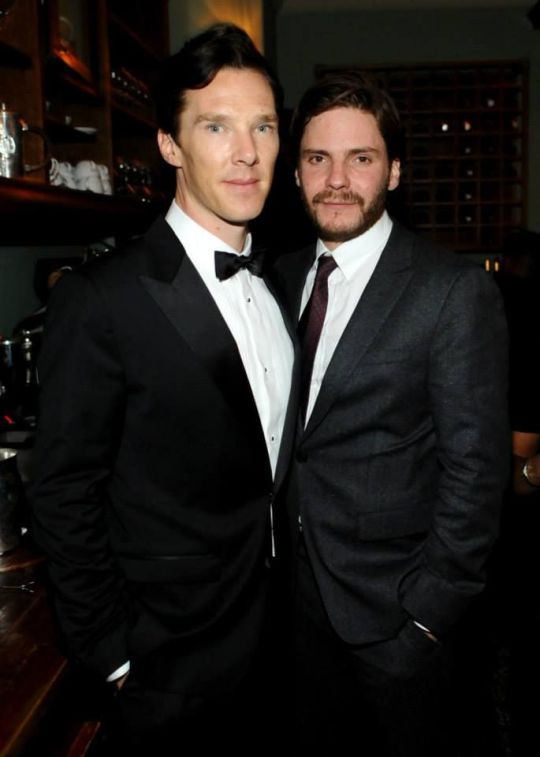
It makes so much sense to me that amongst all of the Hollywood A-listers Daniel Brühl got to work with in his career, only Benedict Cumberbatch attended/was invited to his wedding. (Referring to something mentioned in "A European in Hollywood", an Arte documentary about Brühl. The video with English subtitles is no longer on YouTube but for those who don't need translations, you can see it HERE.)
I can picture them animatedly conversing for HOURS over wine and tapas, phones ignored unless it's family calling, totally present. They just have so much in common: the curiosity, warmth, and depth that come across when they speak and reflects in their eyes; the sharp wit and self-deprecating humor paired with their goofy and playful nature; the effortlessly refined, cultured, and self-assured manner they carry themselves with; their talent for languages and voiceover work; their passion for acting and the likeability and vulnerability they bring to their characters however morally questionable; the sense that they can't comprehend the good fortune they've been dealt with (and despite their gratitude feel embarrassed by it); the way they always persevere to use their platform for a humanitarian cause (perhaps related to previous item); how grounded they've remained despite everything and the boundaries they've drawn with their private lives.
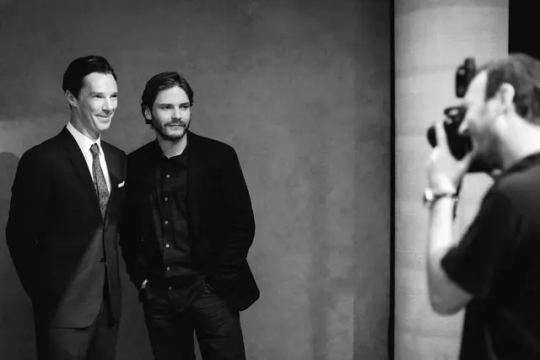
Their rise to worldwide fame also has a similar pattern. Though both have been around for a long time, doing chameleonic work with their roles, they were often overshadowed by the bigger names in their Hollywood projects. For Cumberbatch, it was his role as Sherlock that changed everything. Overnight, the pedophile in Atonement became a sex symbol... just like that. For Brühl—who's had a golden career in German and world cinema since his 20s—it was his role as Helmut Zemo that made him recognizable and beloved to a mainstream audience. After his playful take on the Baron in The Falcon and the Winter Soldier, rabid fans were more than willing to forgive and/or forget that he bombed a UN conference AND tore the Avengers apart in Civil War.
I even see a parallel in how they've mostly had long-term relationships and only got married in their late 30s. (If Wikipedia is to be believed, both at age 39.) Unlike celebs who marry and divorce all throughout their lives, you get a sense they take commitments seriously.
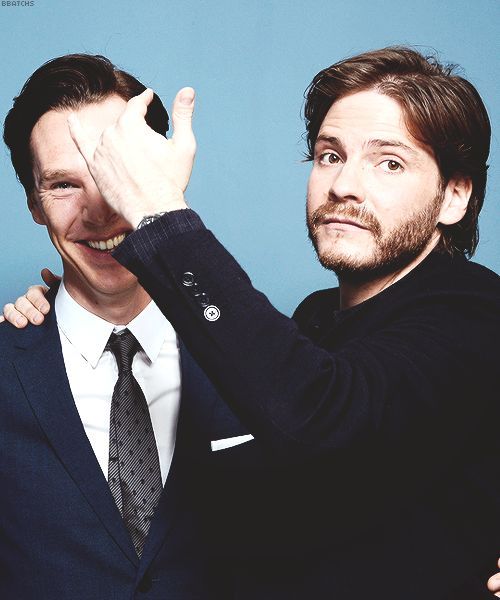
And what about their names?? You thought Benedict Timothy Carlton Cumberbatch was a mouthful? Try reciting the litany that is Daniel César Martín Brühl González Domingo.
#daniel brühl#benedict cumberbatch#baron helmut zemo#sherlock bbc#sherlock holmes#tfatws#the falcon and the winter soldier#the fifth estate#atonement#captain america civil war#helmut zemo#3am thoughts#well this turned out longer than I planned#obsessions#it be like that#doctor strange#marvel cinematic universe
20 notes
·
View notes
Note
I love the Hollywood starlet max asks — one thing that I’ve been thinking about is Daniel and how he feels about Scotty.
He’s so in love with Max and so far gone for him, but he had loved Scotty that he married him. Was Scotty a childhood sweetheart and now they’re two different people??
Daniel and Scotty are close. They got married early but they also have wildly different careers that they're both very successful at. Scotty is still a snowboarder and he's off doing competitions and training and being a red bull athlete, Daniel is a hollywood a-lister who has been tied up in a long standing blockbuster contract so he spends all of his time on sets or just at home. he just finished the last movie of the series and signed on to do this romantic drama for a change of pace when he meets Max
Daniel and Scotty are pretty much married in name only and its not that they don't care about each other but theyre comfortable with the way things are. and Daniel knows that Scotty is dating someone quietly, and Scotty is ok with Max, Daniel just didn't mean for shit to blow up the way it has.
He cares for Scotty and respects him enough to not want to embarrass him like this, but shit happened
7 notes
·
View notes
Note
actually, since we've brought up the espn sob stories and i'm still seeing "lando is the shittiest teammate on the grid" takes in the year of 2023, when lando has been nothing but kind and supportive of the rookie who is already challenging him more than daniel ever has, let's talk about what the daniel teammate experience is really like.
-lando is labeled a shit teammate because he says he doesn't feel sympathy for daniel's situation. in the same interview, he explains how he would also face criticism if he underperformed to that extent. on one of the occasions with the "no sympathy" comment, he even mentioned how if he had performed that poorly relative to ricciardo during their first year as teammates, he probably wouldn't even still be in f1. basically, he explained how f1 works: you perform, or you're out (unless daddy horner saves you). yet, here he is, lando norris, the shittiest teammate on the grid.
-then we get to ricciardo's ESPN sob stories (oop. i meant journalism. very respectable journalism) that is full of so much bullshit, the sources of it (his Hollywood management corporation) had to wipe their mouths with toilet tissue after spewing this bullshit.
-"lando isn't actually talented, they just design the car around him, and according to the almighty ricciardone, it's undrivable so he would flop if he switched teams." A) why is lando's loyalty always attacked by daniel and his team? sorry the old man is reminiscing on his career and having regrets now, but nobody made him leave red bull. that's a choice he made all on his own because he had a younger, faster teammate (he and his fans also spun that as red bull sabotaging him, yet now he's begging to go back, funny he exposes his lies himself). B) James Key, thank fuck he's gone, even mentioned designing the 2022 car with daniel's feedback specifically in mind to make him more comfortable. yet he regressed further. lando has never once, with any mclaren, said "yes, this is 100% what i want in a car." hell, he just got p2 and spent much of the weekend complaining about how shit the car's balance was, lando is just talented enough to drive around that stuff. has nothing to do with the car being designed around him.
-then there was the (again, if he doesn't care not to weaponize something against lando that lando has spoken about impacting his mental health (and is even celebrated and cheered on for it), why the fuck do we have to treat daniel with special care and not bring up his MULTIPLE failures because "pOOR BABY WABY DANNY'S MENTAL HEALTH") whole "I've never thrown away a win like lando has." Yet …. to get that win, he needed the two top drivers to crash out and his teammate to be told he isn't allowed to fight for his maiden win. similarly, lando was there to fight and defend daniel. yet, regularly how it worked with the chronic victim, he's nowhere in sight when it's time to return the favor and actually help his teammate. i can say this with 100% confidence: had carlos been with the team in 2021, both he and lando would be GP winners right now. lando led the majority of that race — no team orders, no teammate around for help at all — yet in the end, it was a team strategy decision that costed him. nothing to do with his driving abilities at all (like the reason daniel lost his seat for).
fuck daniel ricciardo. i can say that with 100% confidence too. thrilled to see him fail again, hopefully maybe then the racist old jerks at Red Bull will give yuki the recognition he deserves but i doubt it.
i love u 🧡
28 notes
·
View notes
Text
Along the way the cast has changed, but every time Friedman seems to have found actors with the charisma and rapport to make audiences care about Frank, Charley and Mary. “Every one of my actors has humanity, and I’m not just being soppy about it,” she says. “You can cast this show a million different ways and it will work, but you do need good hearts at the center of it.”
In casting, Friedman follows her instincts. She banked on the chemistry between Radcliffe, Groff and Mendez even though she’d never seen the three of them in a room together. “You just know,” she says.
As Broadway regulars, Groff and Mendez knew each other, but not well; neither had met Radcliffe. The three leads got acquainted over Zoom before meeting in the rehearsal room, where they discovered they had a lot in common — including big, unironic theater-kid energy.
Groff and Mendez both recall an early rehearsal when, left to themselves as the ensemble worked on a separate sequence, the trio clustered in the back of the room to talk exhaustively through the lyrics of “Old Friends,” the deceptively jaunty song that’s both a celebration of and an argument about what friendship truly means. “That was the moment I thought, ‘Oh, we’ve reached it,’” Mendez remembers. “‘We’re an actual team.’”
Radcliffe isn’t a Broadway baby to the same degree as Groff or Mendez, who launched their careers there. But the former “Harry Potter” star nonetheless feels a special connection to Broadway as “Merrily” brings him back after credits including “Equus” and a yearlong stint in “How to Succeed in Business Without Really Trying.”
Radcliffe isn’t a Broadway baby to the same degree as Groff or Mendez, who launched their careers there. But the former “Harry Potter” star nonetheless feels a special connection to Broadway as “Merrily” brings him back after credits including “Equus” and a yearlong stint in “How to Succeed in Business Without Really Trying.”
“It’s always been such an important part of my life and career,” he says. “This was the first place that I felt like I could become an actor and not just Harry Potter.” He adds, “Also, we listened to a lot of Sondheim as a family in the car — I thought everybody did! The idea that I’m now doing one of those shows is mind-blowing and incredibly cool.”
Of the three leads, Groff has perhaps the hardest job as Frank, who abandons his friends and his art in favor of empty success in Hollywood. Like so many of the characters in “Merrily,” Frank starts the show at his most vile. “I’d never felt so hated, for so long, by the audience,” Groff recalls of his early Off Broadway performances. “Trusting the complexity of the character and detaching from the need to feel liked was a big learning curve for me. Now I live for it.”
At the same time, Friedman’s production grants Frank uncommon grace. With a light touch, the director positions “Merrily” as one man’s memory play as he looks back at the mistakes he has made. “I don’t see Frank as guilty,” Friedman says. “I absolutely believe none of these characters are cunning or premeditated. Everything they do comes from loneliness and the need for love. They’re beautifully naive in their hopes for themselves.”
But what gives any production of “Merrily” its power is how effectively it dramatizes how those ambitions can curdle and those bonds can fray with the relentless passage of time. Radcliffe says, “One of the truest things Maria said about the show is, ‘The happier you guys are at the end, the more absolutely devastating it is for an audience. And I do think that’s true. I mean, hopefully not totally devastating.”
12 notes
·
View notes
Text
Nope (2022)

Nope once again confirms Jordan Peele as one of the most interesting storytellers working in Hollywood. Once you learn what this movie is, you think you know in which direction it’s headed but you’re dead wrong. Even if you think you know what tone Nope is going for, you’re wrong. There are some big surprises within so it's best to go in knowing as little as possible, but if you need more information, read on…
In Agua Dulce, California, Otis “OJ” Haywood Jr. (Daniel Kaluuya) and his sister Emerald “Em” (Keke Palmer) experience a strange power outage. Soon after, they spot an unidentified flying object. After the ship takes away one of their horses, they decide to record the UFO and sell evidence of its existence.
This isn’t the classic horror alien abduction story you think it is. I wish I didn't have to tell you this so the turns this film takes would be even more surprising. Then again, I also don’t want you going into Nope thinking you’ll get one thing when you’re actually getting another. I will tell you that this is a horror movie - at least for the most part. The UFO is frightening, particularly once you realize what it’s doing with the things it abducts.
There’s another scary idea at play here too, which is where the film’s title comes from. Now more than ever, our culture is obsessed with looking at and documenting things. Countless people have achieved fame and fortune without any “talent”. They've simply shot something that went viral and managed to turn that luck into gold. Everyone wants that because it seems so easy. This has made us all a little bit more prone to horror-type scenarios. When you see something weird, how many of us – because we carry high-quality cameras on our persons at all times – might go “Let me start shooting” instead of saying “Nope!” and following our instincts to run away? Haven’t we spent years telling people in horror movies NOT to investigate because we know there’s something scary making that noise? That’s what Nope is about. It’s about people who see this dangerous thing and say “I can profit off of this” when they should know better. This theme is echoed in a subplot that is gripping… but arguably unnecessary. Steven Yeun plays Ricky “Jupe” Park, a former child actor who has been exploiting an on-set tragedy from his early career for years. When you hear whispers of the horrifying incident, you desperately want to know how it went. It’s all told in flashback so you know he makes it out alive but you forget all about that as the scenes play out. It's a great side story and it fits in with the theme but this film is also 130 minutes, and I’m not sure it needed to be. The other “flaw” is the tone of Nope. The film shifts from one kind of story to another so much that by the end, it almost feels like you’re watching a completely different film. I say almost because the shift is logical, it’s organic and it makes sense based on the characters. I love that I had no idea how the movie was going to end but some people who are accustomed to more traditional forms of storytelling will likely feel like they got sold something different than was advertised.
Like Jordan Peele’s other films, you could sit down for hours talking about Nope. Its characters, what each little detail means, the stories within the story, the reinvention of ideas we thought we’d seen mined all the way through, the performances, cinematic techniques, and more importantly, the way it explores its themes of exploitation and spectacle. There is a lot to digest here, which makes it a rewarding film. While repeat viewings will not have the same impact as that first watch because the surprises are so important, there is so much going on here that there’s no way you can catch all of Nope in one go. (February 12, 2023)

#Nope#movies#films#movie reviews#film reviews#Jordan Peele#Daniel Kaluuya#Keke Palmer#Steven Yeun#Michael Wincott#Brandon Perea#Keith David#2022 movies#2022 films
2 notes
·
View notes
Text
for : @unscripteds
location : julia and daniel’s hollywood home.

for julia, there are three inevitabilities in life — death, taxes, and pauline. when she started her career, glittered with moxie and delight, she hadn’t considered that her lawyer would play such a prominent role in her personal life. pauline had seen julia through four divorces, the start of a fifth that was swiftly discarded, and now through the embarrassment of a failed engagement. julia had known from the start it was a mistake, too ashamed and perhaps prideful to admit how outrageously misplaced her emotions had been until a drunken evening with daniel took an emotionally raw turn. even in her liquored haze in the darkness of their malibu hideaway, she couldn’t deny it anymore. so she left at the crack of dawn, burdened with the task of setting jude free from this farce they’ve created . . . only to realize he had disappeared himself and with quite a hefty balance. she’s still getting the final count of everything that had been taken in the night, and her recent isolation is more compelled by humiliation than any financial woes.
days had passed, and she tucked herself away in her iron estate — aside from a phone call from her mother and texts to zarah, pauline had been the only person she’d been in consistent contact with. she knows she’ll have to speak to daniel about . . . well, everything, but she also doesn’t remotely know where to begin. i miss you terribly, i love you like nothing else in the world, i was robbed and the engagement ring might be gone, too. after pauline’s finalized her paperwork for the day, she gives julia a pitying squeeze on the shoulder and makes an exit while bemoaning her other clients and the woes of the rich and miserable. the redhead slumps at the kitchen counter, rubbing her temples and trying to keep herself steady. she suspects she hears a steady trail of footsteps, assumes it’s pauline picking up some forgotten item, only to lift her head and see daniel looking back at her. it speaks volumes that her first instinct is to run into his arms and savor all the comfort she’s always found in the warmth of his chest, but she suspects she doesn’t have the right to do that anymore. she also knows that daniel’s probably aware of what pauline’s presence tend to signify. “it’s not what you think,” she blurts out, pauses, then allows a small, meek smile to tug at her lips. “it’s . . . she’s not here for anything, um, about us. that’s not — i’m not . . . ” i’m not interested in losing you at all. “jude left. i mean, i was planning to but, uh, i guess han shot first and all that.” she’s never been the best at vulnerability, but there’s also very little to conceal at this point. especially with daniel. “he didn’t exactly leave empty handed so pauline’s just helping me catalog everything. she said i could take legal action, but i just want it to go away. maybe bury my head in the sand for being a fucking idiot, but what’s new, right?”
21 notes
·
View notes